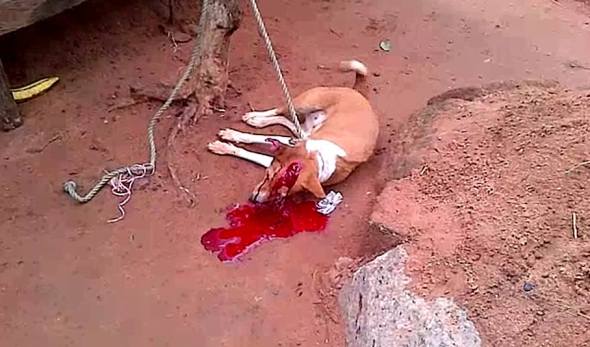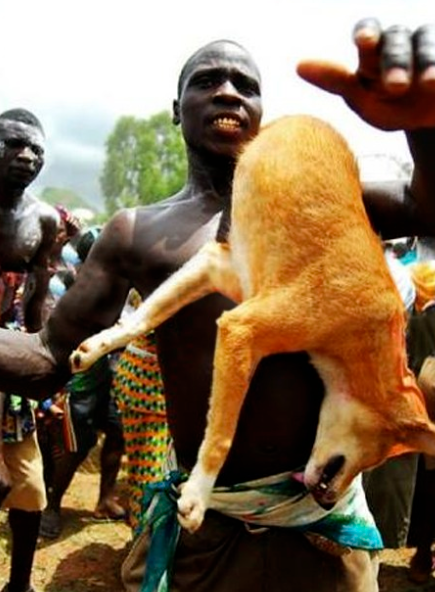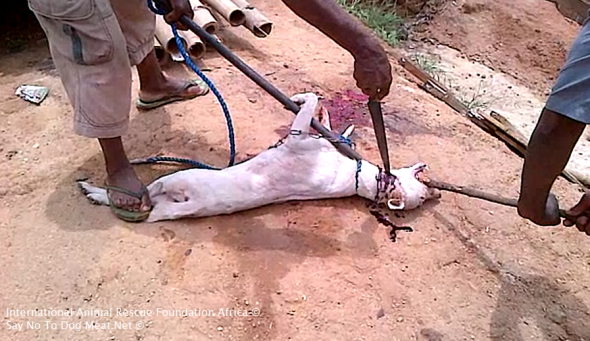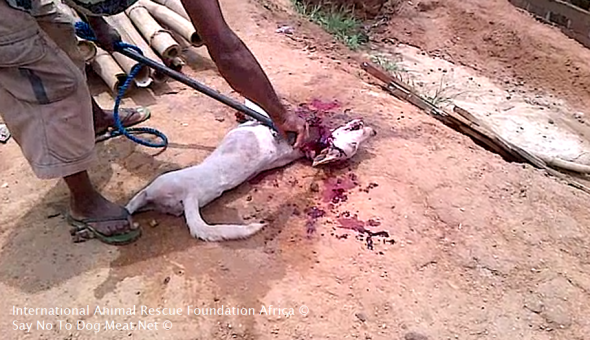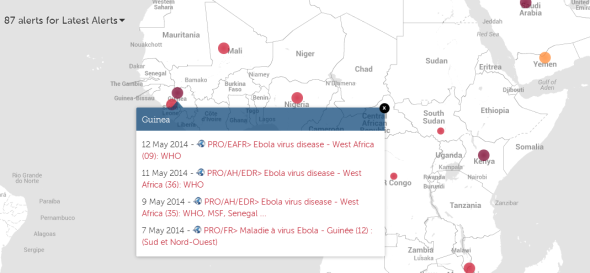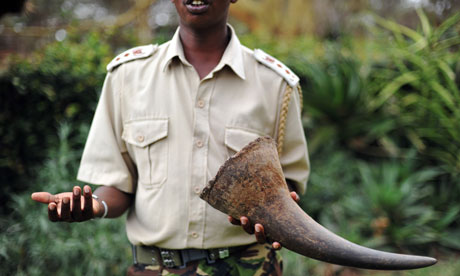Food Violations - Pet Meat Trade | Food Terrorism.
FOOD VIOLATIONS IN THE PET MEAT TRADE
One of thee biggest and most concerning problems I witness within the pet meat trade is multiple food and hygiene violations. Violations that place both human and animal life at risk of disease and in worst case scenarios - Death. Furthermore I often witness many organisations online that either disregard this critically important health risk, or seem more concerned about posting graphic images on the trade while soliciting donations, yet seemingly not bothering to educate their viewers on the “importance of these images and videos, down to how these images and videos can actually help to wipe this repulsive trade out once and for all”.
So today I have again decided to document on such violations, but am going to educate all seven million of our viewers around the world of just how serious the images depicted herein actually are. I am going to keep this document as easy reading as possible, while detailing the facts briefly but in as much detail as I can (without confusing people with scientific jargon). Below I have included a number of images within this document. The images contain small white circles that point out minor and extremely major food violations, all of which in the Western world would see such vendors and restaurants closed down immediately for placing public health at risk of contracting diseases.
FOOD VIOLATION | CROSS CONTAMINATION
Firstly I want you the reader to think - If I hadn’t of circled the most important food violations within this image below, what would you the viewer think of this image? Let me try and answer that question for you. Firstly I’d most likely be enraged that a dead feline had been slaughtered, and is now being prepared to cook to consume. And secondly, (there is no second). There is no second because my own anger, frustration and shock has overwhelmed me, of which that is all I see within this image, a dead cat, and nothing more.
I am now technically angry, and upset that someone has killed an innocent cat, and then I move onto the next image. My next thought would probably be to either leave a derogatory comment under that post, or to donate to the organisation that hasn’t shown any information or education about this image or any “graphic” pet meat trade image whatsoever.
Within the image above I have highlighted nine of the most common food violations that would be prompt any food safety inspectorate to immediately close this restaurant or vendor down within the modern western world. What are these violations? Let’s take a look.
- The window in the far left has a cracked wooden frame that bacteria would/will thrive within.
- On the right hand side of the window is mold that bacteria will grow within, that’s not forgetting the toxic spores that the mold would emit in to the ambient preparation environment thus ending up on the surrounding food itself leading to food spoilage.
- A water bottle that is possibly being used by the cook looks pretty innocent doesn’t it? Well that pretty innocent water bottle is situated next to an uncooked dead animal carcass. While the bottle may be sealed, the cook may cross contaminate that bottle with blood from the animal, simply by a single touch of his/her hand. Once the bottle is turned upside down to drink from, blood drains from that bottle into the cooks mouth which could or will see food poisoning occur from secondary cross contamination.
- The white circle in the right hand side of the image, shows an open window. While that open window may look innocent, the open window is a free entry for pests and diseases to enter into the preparation area thus spoiling the food (E.g.) flies, aphids, and parasites. Furthermore should the outside environment temperature be warmer than the inside ambient temperature, food such as meat, dairy, or cooked meats will heat up, which will see bacteria multiple on the foods spoiling them. For every twenty minutes bacteria is present, that bacteria will double in number. 1,000 bacteria = many thousands more.
- Dirty chopping boards can harbor thousands if not billions of bacteria, furthermore if this chopping board hasn’t been washed or even replaced every six months to a year, it looses its triclosan (antibacterial cover) which helps to kill off bacteria. While there is a wooden board present, that too is just as disgusting and filthy, and harboring anything from a million to a billion bacteria.
- The black bucket itself is a breeding ground for any bacteria to thrive in. The black bucket has what looks like chaff marks on of which bacteria will weed themselves out of and contaminate any food nearby.
- Vegetables that are unprepared or prepared shouldn’t be anywhere near a “raw meat preparation zone”. Vegetables and meat cooks at different temperatures, furthermore meat and vegetables require either shorter or longer periods of cooking. Salads should not under any circumstances be anywhere near “raw meat zones” whatsoever.
- Cracked tiles are the perfect breeding ground for any would be bacteria to grow. Furthermore cracked surfaces cannot be cleaned adequately which in turn leaves the area unclean. I wouldn’t even want to guess how many millions of bacteria are actually present within this single cracked tile.
- Blood and general dirty surfaces is not good food practice, and should any salad vegetables come into contact with this surface, I’d hate to think just how much bacteria the “customer” would be consuming (over that of pet meat).
The above nine food violations are commonly seen within all Asian and African unregulated food trades. These type of violations are commonly identified as (cross contamination’s). With no regulation or even monitoring of these trades, it paves the way for trillions of bacteria, diseases and virus to spawn their way into the general public’s food thus equaling food poisoning caused by human negligence.
As a human and environmental scientist I am at the best of times shocked if not perplexed at the sheer ignorance of Asian and African governments that are all up for protecting human health and safety, yet unregulated meat trades such as the above - are an imminent disaster waiting to happen on a gargantuan scale. On one end you have armed forces and police protecting people from terrorism or terrorists of which each terror atrocity kills on average 100-200 innocent civilians (Est). Yet in Asia a staggering (700,000) people die from food poisoning annually. Source: http://www.iccservices.org.uk/pdf/Food_Poisoning_Facts.pdf So I think its safe to say that food poisoning viruses are indeed the biggest threat to homeland security, something Asian and African governments seem oblivious too.
“FOOD TERRORISM KILLS 700,000 A YEAR IN ASIA ANNUALLY”
Lets leave food poisoning out of the equation now and concentrate on actual “human on human terrorism” of which in the past year terror attacks have risen by 80% in the past 365 days. Furthermore lets not forget the very (concerning 700,000 thousand innocent people), most of which are food consumers that are killed by poor food hygiene in Asia alone.
Back in 2014 the Global Terrorism Index (GTI) stated that some 32,658 people were slaughtered by terrorist attacks worldwide, totaling on average a combined 140,000 terror attacks. 2014 was marked by the (GTI) as being the largest kill rate seeing terrorist kill rates soar by some 80% in a single year from 2013-2014. Source: http://economicsandpeace.org/wp-content/uploads/2015/11/Global-Terrorism-Index-2015.pdf
The index ranks the level of terrorism in 162 countries - representing 99.5% of the world’s population - by measuring the number of attacks, injuries, deaths and property damage as a result of terror attacks. The UK ranked 28th in the index - higher than the United States, Iran and France, although the report did not include the impact of the Paris attacks in which 129 people were killed.
Terrorism remained highly concentrated in just five countries, with Iraq, Nigeria, Afghanistan, Pakistan and Syria accounting for 78% of terror-related deaths in 2014, the index found. The UK recorded the highest number of terrorist incidents of Western countries with 102 last year, although they did not result in any deaths. The majority of the attacks were in Northern Ireland and involved the New IRA, the report said.
CAN YOU SEE THE TERRORIST?
Okay, so now I am going to show you a picture below of which its very obvious what the image depicts. An armed individual that has “probably killed numerous innocent civilians”. Can you see him? Keep telling yourself, “I can see him, he’s armed and he’s certainly dangerous looking, and he’s very much within my sight”.
 CAN YOU SEE THESE TERRORISTS?
CAN YOU SEE THESE TERRORISTS?
So you can see the individual in front of you whom is holding a rifle. 2014-2015 most of the 36,000 people that were killed as a direct result of terror atrocities and/or attacks actually witnessed their aggressor before they were killed. Asian and African governments have been quoted as clamping down hard on terrorism, yet over 700,000 people a year are killed as a direct result of food terror - yet this critically important issue within the pet meat trade seems to be going ignored. 700,000 people is indeed more people killed annually than any terror attack recorded since the WWI and WWII.
In the image below what can you see? Take a good hard long look at this image. Can you see the terrorist or terrorists should I say? The answer is of course - no you cannot see them. You cannot see these terrorists or terror “suspects” as they are approximately 50 to 60 micrometers long (I.e - microbes). Lets take a look.
The image above looks pretty much innocent in the sense that there is no immediate threat whatsoever to human life. The woman to the right is not armed, and the guy to her right is going about his daily duties of food preparation. Unfortunately there are over a dozen terror suspects within this image waiting to take action on their next victim[s]. That victim could have been anyone of the 700,000 Asian citizens that consumed dog or cat meat from unhygienic premises, that poses a direct “threat to human health” in the way of “food terrorism”. So lets take a look at these non-visible, and virtually invisible terrorists.
- A dirty cooking pan hanging from a filthy brick wall. Any species of animal could have at some point took refuge on this wall. Lets say a chicken. Chickens defecate, and with chicken defecation comes germs and bacteria. Salmonella is the number one terrorist then in this situation, as salmonella can easily be passed onto humans via chicken droppings.
- An innocent (unarmed) cooking lid, looks pretty much cool, calm and collected. What’s harboring underneath that lid though, or more to the point - what has the lid been placed on? Lets say a dog has rubbed its backside up against that wall (yummy)!. What’s the likelihood of contracting a virus? High if that lid is not cleaned. and the virus is? Toxoplasma gondii is likely. The lid could be innocently placed onto or next to raw non-cooked or cooked - foods thus equaling (cross contamination).
- Dirty rags, Mmm, looks pretty much safe, and not likely to pounce or fire a quick succession of AK47 rounds off into the air. What the hell is on that rag though that’s most likely going to be used to clean pots? Flu viruses, Rhinovirus, Norovirus, E. coli, salmonella, Clostridium difficile (C. difficile) and campylobacter are all just a handful of nasty food germ terrorists that we really don’t require within our food from filthy rotten germ infested rags. Oh just for the record, Norovirus kills over 200,000 people a year. Lovely!
- Not quite sure what this is hanging down from the main food preparation area (that shouldn’t be outside). Whatever it is, its not important as such. More what has landed or took refuge on this overhanging decoration. Let’s say wild birds have visited for a brief eavesdropping, and they want to leave you a farewell present of wild-bird feces. Any food that is prepared under that overhanging decoration can become contaminated with a STAGGERING SIXTY DISEASES that you seriously do not want in your food! One of the most serious food contamination’s is that of Avian Flu that has killed many hundreds of people throughout Asia.
- Chemical contamination of food seems to be increasing within pet meat consuming countries - especially on the Asia continent. There shouldn’t be under any circumstances any form of non-food chemicals anywhere near food or within a food preparation area. Lets say this tub of unknown ingredients is “Lean Meat Powder Pork” commonly used in Asian food preparation within China. Lean Meat Powder Pork can cause - dizziness, heart palpitations, diarrhoea and profuse sweating - in worst case scenarios this substance can cause death.
- An open filthy river, again looks pretty much innocent. However any insect such as flies can simply swoop in for a mere taste of the local specialties thus spoiling food. That innocent fly could have anything on its pads from animal dung to dog feces. The most common virus a fly could leave is that of a vomiting virus. Not really what I’d call “good customer service”.
- Hairnets must always be worn within food preparation and raw meat preparation. While there is no real major food terrorist here the woman could have touched a bloodied animal carcass, then patted her hair down. That means a cross contamination of a virus of some sort. Lets say she has touched raw pork, and then goes over to inspect the local ‘cooked dog or cat meat’. She brushes her hair again, and a loose hair follicle contaminated with raw pork blood ends up in food that doesn’t require cooking or further cooking, Hepatitis E viruses, Trichinosis, and Ecoli, are three of many viruses that can end up in food causing severe and unwanted sickness, simply by not wearing a hair net.
- The guy to the innocent woman’s right is again not really looking dangerous, apart from the fact that he has no T-Shirt on or even a protective food apron which is pretty much vile and a 100% food violation within the Western world. Aprons stop anything from hair, skin cells, down to human viruses from being passed onto the food. Furthermore gloves are not being worn for the “average of twenty minutes” that would keep a barrier in between the food prep and the food. Most common types of food virus are vomiting and cold bugs.
- Improper foot-ware is not being used within a food preparation area, which could in this case pose a danger “to the food server and preparatory individual”. We know that rabies is very problematic within Asia and accounts for thousands of deaths every year. Should anyone of the (live or dead stolen pets), be infected with rabies, and the man with no proper and safe foot-ware have open wounds on his feet, he’s likely to contract the deadly rabies virus equaling death!
- And finally in at number ten, as like the young man on the floor preparing food, the woman is also wearing open toed shoes which is again a big no no within food preparation or any food service. Unwashed nails contain the natural microflora or resident bacteria and microbes and the transient bacteria from the objects that the hands come in contact with. When the hands are unwashed, there are millions and millions of bacteria living and growing on it. And you really don’t want them bacteria in your food.
CAN YOU SEE THE FOOD TERRORIST NOW?
The whole purpose of this article is to educate not discriminate. Over 700,000 people die every-year in Asia alone from food viruses, and food contamination. That’s 700,000 too many of which The Anti Pet & Bush Meat Coalition are trying to stop in relation to the virus filled dog and cat meat trade. Please sign the petition below and help by donating via the link.
Donate here:
https://www.facebook.com/Anti-Pet-and-Bush-Meat-Coalition-474749102678817/app/117708921611213/
Sign the petitions here on Facebook:
https://www.facebook.com/474749102678817/photos/pb.474749102678817.-2207520000.1452824282./554473384706388/?type=3&theater
Follow us on Facebook here:
https://www.facebook.com/Anti-Pet-and-Bush-Meat-Coalition-474749102678817/
My name is Dr Jose. C. Depre and thank you for reading.
Dr Jose C. Depre PhD. MEnvSc. BSc(Hons) Botany, PhD(NeuroSci) D.V.M.
Environmental & Human Science
Embassy Day: For Cats and Dogs in the Horrific Meat Trade.
EMBASSY DAY: 17TH SEPTEMBER 2015 WWW.SAYNOTODOGMEAT.NET
Did you know on the 17th September 2015 from 11:00am the Australian organisation www.saynotodogmeat.net, registration 49 860 343 527 will be hosting peaceful demonstrations around the globe within nine major cities? Embassy Day forms the first (governmental) lobbying in relation to #OperationUnite 2016. Embassy Day will be the organisations second largest demo since April 4th 2015. Back in April Say No To Dog Meat made history by hosting the worlds largest anti pet meat demo in over twenty five countries.
On the 4th April 2015 the Say No To Dog Meat family hit the streets internationally in their thousands marching for dogs and cats in the horrific pet meat trade. The main April protests were non-governmental, however was a reminder that should the (eight governments) the organisation are lobbying not respond to the polite requests from the Aussie organisation. The next step would be Embassy Day, September 2015. Finally after Embassy Day, the organisation will then begin gearing up for phase two of Operation Unite 2016 that will be held October 2nd and 3rd 2016. Followed up with #OperationUnite comes the new #lovefamily campaign too.
Image: (SNTDM) supporter, #lovefamily campaign.
September 17th 2015 will see demonstrators lobbying South Korean embassies within Los Angeles, United States and Ottawa, Canada. Then in New York the Indonesian embassy, followed up with the Cambodian embassy in Seattle, United States will be demonstrated. Meanwhile within the United Kingdom the Vietnamese embassy will be peacefully protested in London, followed up with the Indian consulate in Belfast, Northern Ireland. The Nigerian embassy in Johannesburg, South Africa will follow soon after. The Thailand consulate within Perth and Philippines consulate in Brisbane, Australia will be peacefully lobbied too.
Donna Armes, campaign manager and director confirmed that all embassy consulate generals and ambassadors had been sent communications months before Embassy Day was planned. Furthermore the campaign manager stated a second electronic communication had been sent and received by embassy staff informing them about the peaceful protests, and why the organisation has been forced to lobby all nine embassies. Embassy staff, consulates and ambassadors have failed to acknowledge the Aussie organisations peaceful plans which is a little frustrating but then the organisation didn’t expect a reply anyway.
Say No To Dog Meat volunteers and directors will begin the ‘peaceful demonstrations’ with an up to date speech on current and past issues in relation to both ‘Asian and African’ dog and cat meat trade outside of each embassy. After the main speech the public can stay or depart of which the organisations volunteers and directors will then be handing into the embassies all data and petitions.
Image: Nigeria, woman prepares dog carcass for [404 joint delicacy, peppered dog soup].
Each petition contains from 10,000 to 200,000 signatures. Statistics on pet meat consumption death rates, virus and disease, regulations and violations of current standing law, predictive model data research, food hygiene violations will be handed into the consulate generals and ambassadors too. Presidential letters will also feature within the pack of which each government has a set six to eight months to respond. The organisation is not expecting an immediate or even positive response, of which OPERATION UNITE will continue to go ahead come October 2016.
For the very first time in history the Indian and Nigerian embassies will be lobbied by the organisation in relation to the Indian, Nagaland and Nigerian pet meat trades. Nigeria is the largest dog meat consuming country on the continent of Africa and third largest on the planet. Furthermore deaths from consumption of diseased or rabies infested pet meat has skyrocketed this year alone with some eighty people dead already. Meanwhile the Indian Nagaland state loses on average an estimated forty people a year via the direct consumption of rabies infested dog meat. Rabies is also on the rise in both pet meat consuming zones. India is where 85% of all human rabies deaths occurred between 1995 and 2004. Over this period there were 21404 rabies deaths a year there. Death rates for 2014 are yet to be seen.
“About 3.5 million dog bites are registered every year in India. The Government cannot give vaccine free of cost to all people. From 2006, the price of vaccine has increased…”
Despite many protests against the South Korean Bok Nal pet meat trade that began in June and ended in the first week of August. The South Korean government took no notice of expert knowledge, scientific data or petitions handed to them. Instead they allowed traders to continue the horrific disease riddled trade, and took little notice of their own laws and guidelines implemented to protect dogs and cats in meat trade. Dare we ask what the point is in introducing animal protection laws, just to allow native citizens to continue violating them?
From 2013-2015 Say No To Dog Meat has vainly lobbied the Viet Nam health minister and president Trương Tấn Sang to bring an end to the pet meat trade. On the 19th August 2014 reports issued by the (World Health Organisation) confirmed that deaths rates had increased slightly to forty (per year), however its estimated that some one hundred people die annually from rabies infection.
Despite the Aussie organisation sending more than enough scientific evidence to the Vietnamese health minister and president the trade continues. From 1995-2004 the then death rate from rabies in Viet Nam stood at some 1,550. Since 2004 the Vietnamese pet meat trade has increased. Death rates continue to increase within the country from the direct consumption of diseased pet meat, statistics from 2014 showed many of these deaths were infant related either bitten by dogs on private land or from consuming rabied infected dog and cat meat.
March 16th 2009 the Vietnamese government were handed third party data from; National Institute of Infectious and Tropical Diseases and the National Institute of Hygiene and Epidemiology in Hanoi, Viet Nam that stated; “Most Rabies deaths in Vietnam were from the direct Butchering and eating of either dog or cat meat”.
Vietnamese researchers confirmed;
“In Viet Nam, dogs with rabies have been detected in dog slaughterhouses and workers at dog slaughterhouses are vaccinated against rabies as part of the national programme for rabies control and prevention. However, the private slaughter of dogs is relatively common in the country which increases rabies infection rates”
“Vietnamese doctors already consider dog slaughtering to be a risk factor for rabies transmission, but it is important that other health care workers and policy makers, both in- and outside Vietnam, are aware of this risk factor”
Dog and cat meat trade is now finally illegal within Thailand, unfortunately this doesn’t stop traffickers from snatching dogs and transporting from Thailand into the Viet Nam. Yes the trade may indeed be illegal, but again our own investigative journalists have located street traders openly selling and smuggling unhygienic meat in rural communities.
Back in 2013 [Life With Dogs] stated; “In the past week, Cambodia, Laos, Thailand and Vietnam have signed a deal with the intention of ending the importation and sale of dogs to be used as food. This move was initiated by their governments because of the involvement of animal welfare group Asia Canine Protection Alliance. The ACPA is comprised of four notable animal groups: Animals Asia, Change for Animals Foundation, Humane Society International and Soi Dog Foundation.
We are now in 2015 and as yet [SpeakupFortheVoiceless] and [SayNoToDogMeat] have yet to witness any such decrease of trade within Cambodia, Vietnam and Laos. Trafficking and snatching of pet dogs and cats continues within Thailand feeding the trade within the Viet Nam and China. Why has it taken from 2013 to do nothing? One only has to walk the streets of Hanoi, Saigon, Hoi An and Ben Tre to witness dog meat traders more than active. On June 30 2015, police from Sakol Nakorn intercepted a truck carrying the butchered remains and carcasses of more than 100 dogs. The truck was heading for Tha Rae, [the traditional home of Thailand’s dog meat trade]. Yet trade is illegal!
Within the Philippines the government has introduced tough and stringent laws with regards to pet meat traffickers and peddlers (Please click the links to view current data from government). Say No To Dog Meat recognizes the Philippines as one of few Asiatic countries on the continent that has taken the pet meat trade seriously. Despite a law banning the killing and maltreatment of dogs (Animal Welfare Act of 1998), dog-eating and the industry that supplies it continues particularly in the northern part of the country. Back in June 23 2013, some 12 dogs were rescued in San Pedro Laguna, according to the Department of Agriculture (DA).
The Philippines government aims to eliminate the country’s dog meat trade by 2016, AKF Head and Legal Counsel Heidi Caguioa told Rappler [2014]. Eradication means no more dog meat traders and no more dog meat restaurants. Say No To Dog Meat will be lobbying the Philippines embassy within Brisbane, Australia calling on the government to strengthen the current Animal Welfare Act 1998 and Rabies Act 9482.
Finally Say No To Dog Meat volunteers will be lobbying the Indonesian embassy calling on the government to enact law and close down all known dog meat markets. The Indonesian dog meat trade is allegedly associated with the Minahasa culture of northern Sulawesi, Maluku culture and the Bataks of northern Sumatra, where dog meat is considered a festive dish, usually reserved for occasions such as weddings and Christmas. While Say No To Dog Meat and our comrades Animal Defenders Indonesia, Surabaya Tanpa Dog Meat, Bali Adoption and Rehabilitation Center would like to believe this, the trade on dog and cat meat actually occurs every day of the month.
This September 2015 please unite with Say No To Dog Meat this Embassy Day 2015. For more information please contact the organisation here via email: contact@saynotodogmeat.info
Image: Say No To Dog Meat, Team Perth.
Chief Executive Officer.
contact@saynotodogmeat.info
Bok Nal: Dog Eating Days - South Korea.
July - August Malbok Festival
South Korea which is located in the southern half of the Korean Peninsular of east Asia will this July to early August host its annual dog meat-eating festival commonly known as “Bok Day”, “Bok Days” or the Malbok Festival. The festival normally begins on the 13th July or 21st July, and runs into early August which is considered the hottest days of the year within the country.
General description:
The event is hosted on the first “Cho Bok” first summer continuing through to “Joong Bok”, mid-summer, on the 28th, and “Mal Bok”, end of summer, on August 7th, lasting 21 days. It’s during this event that South Korean dog and cat meat markets will begin a mass slaughter of dogs and cats. One particularly commonly killed dog is the “Noo-rung-yee” or commonly known as the “Nureongi” a yellowish traditional dog breed that has been bred to specifications over time within East Asia. There are various terms used for this festival which I’ve included within the entire article for your information and research.
To date, and like the Yulin festival there remains no factual estimates from governmental research or observation counts to place an exact number to how many dogs or cats are killed during the twenty-one day event. Some critics have placed the number of “dogs” killed during the entire “Bok Day - dog meat-eating days” at some one million dogs killed during this cruel and barbaric festival. Meanwhile other organisations and critics have placed the number at a much reduced count at some 15,000 during the Malbok Festival.
Sambok (삼복), also known as Boknal (복날), or the dog days of summer, covers a month of time at the peak of the growing season and traditional time that to some South Koreans is classified as a traditional time to cool off and extract some medicinal healing powers from the consumption of dog meat. In reality there still remains no proof or medical evidence that supports the East Asian pet meat consuming beliefs that such meats increase human health.
Image: No mercy for cats either at the Malbok Festival.
The most commonly consumed dish during the South Korean Malbok festival is that of peppery dog meat soup (quite a commonly consumed dish that we have noted within western Africa and central Africa). During the festival dogs will be seen roasted and served on a spit, and prepared in stews too. However as explained the most commonly sought after dish is that of peppery dog meat soup known as (bosintang or gaejang-guk) a dish that is steeped in history dating back thousands of years, and is now commonly consumed throughout western, central and northern Africa.
International Animal Rescue Foundation Africa has uncovered in the years of intensive bush and pet meat trade research Asian construction workers bringing the dish and recipes into the African continent. The environmental companies most shocking report that has yet to be released will finally prove that south Africa has more than its fair share of dog meat traders with illegal “404” joints too.
Bosintang aka gaejang-guk:
Bosintang or “dog meat cuisine” as the dish is commonly known remains part of the traditional south Korean dish. Research on the north Korean pet meat trade also indicates bosintang to be a commonly consumed soup eaten throughout the year. furthermore within the “404 restaurants of Lagos, Abuja and Jos in Nigeria the exact same dish is consumed by locals commonly with very potent gin”.
In reports last month and last year I.A.R.F.A and Say No To Dog Meat have unearthed very concerning data regarding dog meat and gin trade of which has seen countless scores of people dropping dead like flies. International Animal Rescue Foundation Africa and Say No To Dog Meat also uncovered hard and firm evidence that migrant workers from south Korea, China and Viet Nam had introduced the dish of gaejang-guk into the plateau states.
The main primary ingredient of Bosintang or - Gaejangguk (개장국, -醬-) - as its more commonly known in south Korea is dog meat. Dog meat is boiled with a range of aromatic and fresh vegetables with herbs such as chamomile and dandelion added to the dish. (Its believed by some tourists and locals the inclusion of these scented herbs is to remove the strong pungent, and at times nauseating aroma of stewed dog. Doenjang (된장), Gochujang (고추장), and perilla seed powder are also known to be included within this rather unsavory dish.
Bosintang has quite an extensive history within south Korean traditional food. Dating as far back to the 4th century ((AD) After the Death of Christ). We know this because of evidence that was located on the wall painting in the Goguryeo tombs complex in South Hwanghae Province, a UNESCO World Heritage site which dates from 4th century AD, depicts a slaughtered dog in a storehouse (Ahn, 2000). (Please refer to the UNESCO World Heritage site for further information).
The Balhae people also enjoyed dog meat, and the Koreans’ appetite for canine cuisine seems to have come from that era. So in all fairness it’s quite possible the Malbok festival or a similar festival will also be hosted within north Korea too. If this is true then the vast number of dogs killed and consumed for meat will heavily exceed all kill and consume estimates from organisations and animal rights individuals. Unfortunately as we’re unable to freely travel into north Korea to document on this case we’ll never know the full truth. Please do stay tuned though.
During the first day of the Malbok festival (BOK - the first day that consumers are encouraged to dine on the traditional soup or stews), other types of dishes will be on the menu - something that the Australian organisation (Say No To Dog Meat.Net) are currently demanding to be removed off the menu within south Korea.
Image: “Nureongi” a traditional dog breed commonly killed for meat within Asia.
These dishes include:
- Bosintang (보신탕; 補身湯); Gaejangguk (개장국)) – Stew containing boiled dog meat and vegetables.
- Gaegogi Jeongol (개고기 전골) – An elaborate dog stew made in a large Jeongol pan.
- Gae Suyuk (개 수육; 개水肉)- Boiled dog meat
- Gaegogi Muchim (개고기 무침) – Steamed dog meat, Korean leeks (부추), and vegetables mixed with spices
- Gaesoju (개소주; 개燒酒) – Mixed drink containing dog meat and other Chinese medicine ingredients such as ginger, chestnut, and jujube to invigorate one’s health.
~ Source Wiki
While all dishes are considered grotesque, probably the most vile and repulsive of them all is that of the Gaesoju (개소주; 개燒酒). When I say vile I truly mean “vile and utterly bloody disgusting”. There remains some mystery as to what is included within this trinket of liquid dog meat although the very basic ingredients are known. Research from universities in Maine and California have located liquefied dog meat being the primary ingredient, intestines (not normally used in this liqueur type drink), traces of dog hair, teeth, herbs, spices, blood, beef and an entire textbook of virus’s, diseases and, toxins that would normally harm the non-pet-meat consumer.
Both Maine and California scientists confirmed that no medicinal properties were located in either samples or synthetic medications that could give the illusion such a tonic increases libido, lowers blood pressure, wards of evil spirits, prevents miscarriages and, acts as a bodily coolant. However as the tonic, stew and soup are consumed with “liquid” the liquid itself I.e common water helps by decreasing dehydration which in turn helps to cool the body down.
Has the common old aged belief which states “soup” can help decrease dehydration, and helps to reduce cold like symptoms been taken a little to far within in traditional Asian food and medicine culture? It’s possible and what’s more as soup contains liquid I.e water it does indeed help cool the body and relieve some cold like symptoms which is a proven scientific fact.
Cuisine Row and Moran Market:
Cuisine Row - commonly referred to by international tourists as the “Postcard Row” is located behind the local Seoul City Hall which is an area where many dog meat restaurants trade during the Malbok festival. It’s wrong for anyone to state that the festival is confined just to Moran Meat Market as the festival is a common country event gathering that thousands of people attend during the first Cho Bok (first summer) of the Malbok festival.
Back in 2014 one of Seoul’s most “infamous” yet liked restaurants within the “Cuisine Row” closed its doors to trade. Daegyo, an acclaimed Seoul restaurant that had been serving dog meat since 1981, doled out its last serving of boshintang, or dog stew in the first week of September 2014. Daegyo’s owner stated she used to serve over “700 bowls of dog meat stew a day”. Should that figure be correct, and taking into account the entire number of markets and restaurants followed up by the Malbok festival its quite likely the number of dogs (excluding cats) killed within south Korea alone could hit one to two million every month. However and as frustrating as it is statistics on the number of dogs and cats killed within the month-long Malbok festival is still sketchy to say the least.
However lets not all think negative and become emotional. Daegyo’s closed for a reason which in the owners own words “There are no young customers,” she said. To cater to the changing times, Keum-il plans to reopen the restaurant as a Korean beef barbecue diner.
Image: Laws prohibit companion dogs viewing friends killed for the plate in south Korea.
Cuisine Row is quite a sprawling shopping district situated behind City Hall that hosts many restaurants with live and dead meat markets. The most commonly seen shops and stalls are dog and cat meat vendors, however since our last visit to the country many of these restaurants and markets have shut up shop and, like Keum-il has confirmed - reopened as a non-dog or cat meat trading company.
Seongnam Moran Market:
Seongnam Moran Market is often called “Moran Meat Market” due to its unhealthy sales of dogs, cats, chickens, goats and just about any other animal you could possibly think of. However it must be noted Moran Market doesn’t just sell meat or live animals. Vegetables, clothing and more or less the same products you purchase at home in your country are also on sale within the countries largest bustling market hence its true name “Seongnam Moran Market” and not “Moran Meat Market”. The market is located within Seoul and has been notoriously described as hell on Earth by activists and tourists.
Seongnam Moran Market is located within the Gyeinggi-do-province which is south Korea’s largest “five-day” open market. The market is known by the locals as a farmers market which is where we now bring the horrors of Bok Nal to you. Strangely the days ending in “4 and 9” is when you’ll witness more street vendors within the markets bargaining and selling anything from dogs, cats, haberdashery to clothing too.
Image: Moran Market is known to be the largest supplier of dogs in the country.
As you venture into the center of the market the stench truly is gut churning. Dogs and cats can be witnessed in small cramped cages most of them still wearing identification collars. Many of the dogs and cats suffer from a wide range of illnesses, parasites and diseases “unfit for human consumption” of which are still beaten, killed then sold to the unsuspecting locals.
On visiting the market few years back I counted on average around twenty-three stalls that sold “just dog and cat meat” or live dogs and cats. Many of the stalls host their own unhygienic butchery of which there is no refrigeration, chilling cabinets or freezers to slow down food decomposition. One of my major concerns was fact that both “live animals, raw and cooked meats were laying next to one another. Within the western world this would be considered a food hygiene nightmare forcing the local food inspectors to close such entities down immediately. Selling diseased animals next to raw, cooked and under-cooked meat is tantamount to murder or common assault.
Purchasing any animal, raw or under-cooked meat is not only dicing with death but also spreads diseases and virus onto other people which is probably why we now have quite an extensive increase of Avian Flu and now MERS outbreaks within dog meat-eating zones and states of America and Europe where dogs have been rescued and flown out of South Korea. Dogs but not cats can host Avian Flu. To date there is no proof that rescued dogs from south Korea brought back into the states of America have spread Avian Influenza.
Moran Market is known as the largest supplier of dog and cat meat within South Korea. When the Bok Nal festival kicks off there is within the region an estimated (100,000) dogs and cats killed within the first few days alone. However please remember this is based on estimated figures that do not present any proof that such number is factual.
A member of the public whom was investigating the market stated “cages and cages stuffed with chickens, roosters, black goats (extracts and soups), bunnies, kittens (medicinal extracts, stews, and soups) and the crush of so-called “meat” or yellow dogs (Nureongi), ubiquitous, crammed together, in obscenely filthy cages”. Sadly this is common within Moran Market and something that the Australian organisation “Say No To Dog Meat” are taking seriously.
The law:
Despite laws that have been drafted into place to halt such abuse, dog and cat meat traders will this July into early August beat, blowtorch, hang and inhumanely kill countless dogs and cats. Back in 2007 the south Korean government made history by making “An act of killing in a cruel way such as hanging” and “an act of killing in an open area such as on the street or in front of other animals of the same kind watching” are explicitly prohibited until Article 7 (1) of the Animal Protection Act of 2007. Unfortunately the laws apply to abuse rather than prohibiting the trade full stop.
However sadly, dogs and cats are brutally beaten in front of their companion friends (a violation of APA 2007), electrocuted (a violation of the APA 2007), hung from rafters in the markets alive (a violation of the APA 2007) and, furthermore street vendors continue to kill in open spaces as well within the center of the market (a violation of the APA 2007 Act) - excluding the center market place).
Updates to the policy from 2008 can be briefly read below. The policy is believed to have been brought into practice back in 1991
Animals under protection should be free from the following (Article 3 Animal Protection);
- Hunger and thirst.
- Able to express natural behavior.
- Free from pain and disease.
- Free from fear and stress.
- Animal Welfare Act Plan should be updated every 5 years and local governments shall cooperate with the central government.
The Animal Welfare Act Plan includes the following:
- Basic policies on animal welfare and prevention of animal abuse.
- Management of lost and abandoned animals.
- Policy on Animal Experiment Ethics Committee.
- Policy on farm animal welfare.
Image: Puppies are sold for slaughter within Moran Market - A violation of the APA.
Interestingly and despite just about every rule in the book being violated come this July’s Bok Nal festival under Article (19 Animal Protection Warden) the government or any organisation must provide an experienced and duel qualified warden to walk the market places and “non-Moran Market” zones to ensure that the Animal Protection Act 2007 is being enforced.
The following legislature states:
The Minister of Food, Agriculture, Foresting and Fisheries, Mayor or Governor and Mayor or County Magistrate must appoint an animal protection warden in order to manage the work related to animal protection. The Minister of Food, Agriculture, Foresting and Fisheries, Mayor or Governor and Mayor or County Magistrate can appoint a person recommended by a private organization approved by presidential decree, or a person who is well learned and experienced in animal protection, as the animal protection warden for the monitoring of animal abuse and rescue and protection of abused animals.
The Animal Protection Act was allegedly brought into practice back in 1991 however is more aimed at the “slaughtering of animals” rather than the upkeep, care and abuse in general. Say No To Dog Meat.Net are lobbying the south Korean government to amend the current legislation to include more rights and welfare for animals. Say No To Dog Meat.Nets petition can be seen below that holds over 150,000 signatures. Please click on the image link and help the organisation by placing your signature to the petition that will eventually be handed direct to the south Korean president and Mayor of Seoul.
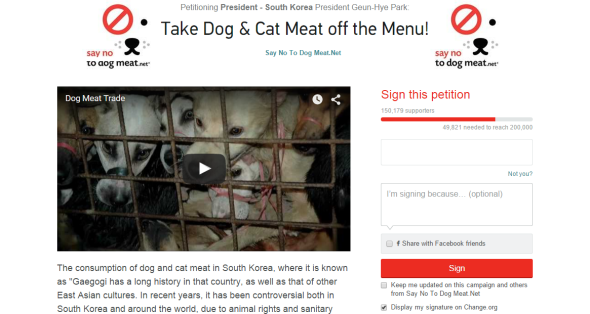
Image: Click the image above and help Say No To Dog Meat.Net end this torturous trade.
Statistics:
As explained in many past and present articles there remains no “factual” governmental statistics that can prove how many dogs and cats are killed “year round” within south Korea and, no real data to prove how many dogs and cats have been killed during the Bok Nal festival past and present. Without these statistics organisations such as Say No To Dog Meat must then rely on visual reports from the ground, interviews with traders and restaurant owners.
It would be deemed as grossly unprofessional for any organisation or individual to place any number into the domain without proof then ask for public donations. Instead bringing the trade and abuse into the limelight is considered more of a realist approach in the hope it will eventually bring the government to its feet to ban the trade or implement tough legislation to prosecute traders whom violate the laws already set out. Below are (estimates) and must not be taken as a proven or accurate statement.
The following data below derives from actual traders on the ground that have been interviewed during and after the Bok Nal festival. Included beneath is the average price of dogs and price for slaughter.
Estimated statistics on consumption and ownership:
- Trader 1 - Dog and cat meat restaurants number around 500-600 in Seoul alone.
- Trader 2 - During the last summer festival “estimates” of some 5 to 6 million dog meat dishes were sold during the twenty-one day event.
- Trader 3 - According to the Korean Kennel Foundation it’s believed that some 3.5 to 5.0 million dogs are kept as companion pets nationwide.
Estimated south Korean dog price and slaughter info:
- Gyeongdong Market in central Seoul - trader 1 states that the average price of slaughter/preparation/cooking and bagging is around 150,000 won.
- The current starting price for one dog comes in at 120,000 won and can exceed 190,000 won to 200,000 won stated trader 2.
- Separate pieces of dog meat are usually sold by weight, 5,000 won per geun (1.3 pounds/0.6 kilograms) explained trader 3.
- Another commonly served dish is sliced dog meat. A whole dog usually costs around 300,000 won in restaurants trader 4 stated.
- Gyeongseong Oriental Medicine Clinic, located near the market ask 350,000 won for a month’s worth of gaesoju; they charge half that if the customer provides the dog. Customers have to pay 20,000 won extra for slaughtering.
~ Source JoongAng Daily.
Image: Gyeongdong Market in central Seoul.
Changing Times:
While the trade in dog and cat meat continues times are in fact changing despite some organisations stating the trade is out of control to the point it cannot be controlled. Say No To Dog Meat, In Defense of Animals, Humane Society, Soi Dog and countless other organisations are all working towards providing dog meat traders with a more sustainable and healthier trade. Say No To Dog Meat’s mission for example is not just about “banning the trade”. One must remember this is indeed a trade and taking away people’s livelihoods despite the fact the western world sees such trades as cruel - will only increase unemployment, poverty and crime.
The board of directors have since founded, already devised a strong and trusted plan supported by over fifty thousand people and counting. Your donation can make a difference by providing traders and farmers with land and equipment to create a more attractive, non-abusive and a prosperous future ahead instead of using any donation to purchase dogs or cats from traders which only increases the circle of abuse.
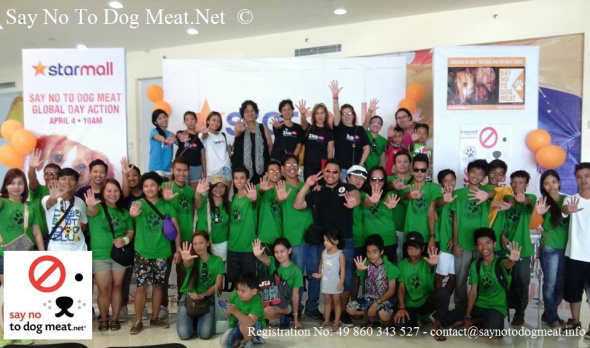
Image: Cebu, Philippines young activists aligned with the Say No To Dog Meat.Net organisation make their voice heard this past April 4th 2015 for S.N.T.D.M’s mass global anti pet meat trade demonstrations. The event hit Asia by storm supported by countless organisations and animal loving individuals. Say No To Dog Meat.Net rolled its youth education program out last year and has already seen a massive response from the young Asian community. Cebu children sent a message via Say No To Dog Meat to the pet meat-eating community - Please click the link above to view that message on Facebook. To join the Youth Club please contact: contact@saynotodogmeat.info today.
Creating fruit farms, vegetable farms, cotton farms, is one of many options already implemented by some organisations and the organisation Say No To Dog Meat. Establishment of pet rescue clinics has already been on the Say No To Dog Meat agenda of which removes dogs and cats from the streets, treating and, re-homing to trusted and caring families locally and internationally.
Many young people from all over Asia have already joined the Say No To Dog Meat mission and to date are lobbying with the organisation to bring this trade to an end while creating education and awareness to the many younger generations. Spreading the word among the young is pivotal and, has already proven to be a positive step for the Say No To Dog Meat organisation and mission objectives.
Say No To Dog Meat.Net:
Say No To Dog Meat.Net was established back in 2012 and founded in 2013. The organisation’s team are tackling traders within south Korea; Viet Nam; Cambodia; Thailand; Philippines; Nigeria; Ghana; Liberia and, Niger. Since founded Michele Brown, myself (Jose Depre), Donna Armes and our sister organisation have begun intensive lobbying of south Korean ministers, south Korean President, and the mayor of Seoul.
Say No To Dog Meat which is not related to the British charity (No To Dog Meat) also hosts petitions for each country they are actively working to end the trade within. South Korea being the most prominent of which the Aussie organisations petition holds over 150,159 signatures. The organisation requires at least a million signatures that will form part of the #Operationunite project bringing activists together to end this barbaric trade once and for all while offering dog and meat traders a way out of their traditional trade and, into a trade that is more profitable and all-round healthy.
Image: Stray dog looks on in sadness as friends are killed in front if him.
You can help Say No To Dog Meat.Net below:
- Sign the petition calling on the South Korean Government to take dog and cat meat of the menu.
- Get involved this September that will see many individuals lobbying for change this Embassy Day. South Korean embassy will be one of many embassies that the organisation will be pursuing for change.
- Encourage the younger generation to become involved. Say No To Dog Meat are currently seeking all young animal lovers to draw or paint their thoughts and, send in a small written message addressed to the South Korean government with an image of their hand with the words “I Say No To Dog Meat” on. (Watch the page for new updates)
- Host an awareness and education day this July in your city or begin planning for an adult/youth awareness and education day for Say No To Dog Meat’s #OperationUnite 2016 events.
- Donate. Say No To Dog Meat.Net cannot tackle the dog meat traders or farmers without your donation. (Please note: Say No To Dog Meat.Net “does not accept donations via cell phone devices”. All donations can be made via direct online transactions “safe and secure” or you can donate to the Say No To Dog Meat’s Environmental Companies F.A.A.W.S bank account on Pay Pal. Simply input this address - info@international-animalrescue-foundation.org.uk and add the amount. You’ll receive like the SNTDM organisation will an electronic receipt, and you’ll be entered into the organisations free news letter subscription service.
For further information please contact the organisation hereto: contact@saynotodogmeat.info
Thank you for reading.
Dr Jose C. Depre
Chief Environmental Officer and CEO.
info@international-animalrescue-foundation.org.uk
Say No To Dog Meat - Demonstration, Rescue and Rehabilitation.
An organisation called Say No To Dog Meat.Net are holding an event on the 4th April 2015 at 10:00 am internationally. The event that’s been in the planning since last year is to be held in many countries from London, Australia, Canada, America, Serbia, Indonesia, South Africa and more. For more information on Say No To Dog Meat’s global demonstration please click this >here< that will direct you to their Facebook page event forum.
Say No To Dog Meat was formed by three Chief Executive Officers that work within the environmental and animal rescue sector. The organisation has to date attracted hundreds of thousands of people worldwide, readers and supporters to their cause. Say No To Dog Meat is within the transition process of becoming an Australian registered charity, furthermore have recently purchased a run down derelict building within Viet Nam of which will be their main Asian pet medical rescue and rehabilitation clinic. Once dogs and cats are safe from the clutches of pet eaters, traders and snatchers they will be re-homed internationally to loving and caring adopters.
The rescue and rehabilitation clinic is incredibly important to the three Chief Executive Officers their volunteers and staff. Say No To Dog Meat’s rescue and rehab clinic will be one of few such rescues within Viet Nam that actively help to remove strays of the streets within Viet Nam that have no home thus removing dogs and cats from the snatchers clutches whom feed into the cruel and diseased pet meat trade.
B.A.R.C. IS ALSO MARCHING WITH Say No To Dog Meat in their Global March for dogs and cats in the meat trade; 10am Saturday April 4th, 2015. Will you be marching with them too, in your country? For more information email Say No To Dog Meat here at - contact@saynotodogmeat.info for a march location in your country.
While the Organisation is being heavily supported by its sister Environmental Organisation - International Animal Rescue Foundation Africa via media, press and private funding, funds are limited. Say No To Dog Meat need public support both financially and via its supporters through sharing articles, news and helping with organizing events and educational classes worldwide to help reduce the pet trade through honest youth and adult education. Not forgetting educating the public about meat food viruses and viruses as a whole that are passed on or mutate from live or dead animals and meat kept in unsanitary conditions. Some amazing media articles have already been released about Say No To Dog Meat such as here on Dogster and even while underfunded Say No To Dog Meat have already helped shut down a small dog meat market and rescued dogs from the meat trade - Read more here
A unique organisation:
Say No To Dog Meat are unique as their main ambition is not only to end the pet meat trade within Asia and Africa but also the cruel and barbaric bushmeat trade that poses a serious disease and health risk threat to humans and animals. The term bushmeat, also called wildmeat and game meat, refers to meat from non-domesticated mammals, reptiles, amphibians and birds hunted for food in tropical forests. Commercial harvesting and the trade of wildlife is considered a threat to biodiversity and human security. Should the bushmeat trade trade continue to be ignored we’ll see catastrophic declines of wildlife in areas of Africa and Asia of which extinctions are already occurring both locally and regionally of some exotic species.
Say No To Dog Meat also appeals to all tourists visiting Viet Nam to please refrain from making their jobs harder to ban the trade. Its commercials such as this seen below that only feed the trade.

Mission Statement:
Say No To Dog Meat’s founders have decades of experience fighting this inhumane industry and have worked hard to achieve unprecedented access into areas of the trade not readily accessible to most outsiders. The organisations investigative work allows them to gather current, accurate and up-to-date information and images, evidence that is paramount in spreading global awareness and pressuring governmental organizations to enact enforceable animal welfare laws that protect companion animals. Ultimately, the organisations intention is to help create meaningful social and governmental change that results in a more humane world for dogs and cats and wildlife endangered by the bushmeat industry.
The organisation is determined to expose the cruel and ruthless activities within the dog and cat meat trade that are perpetrated by dog farmers, cat farmers, animal traffickers, butchers, vendors and dog and cat eating customers. “This is a billion dollar industry” Co-Founder Donna Armes stated, centered on live companion animals being tortured, killed and served as menu items. “It is a gruesome, violent trade that must be halted” stated Michelle Brown Director of Say No To Dog Meat and Co-Director for International Animal Rescue Foundation Africa.
Video below shows Viet Nam dog snatchers this October caught on CCTV - these dogs are most likely now dead - fed into a cruel and horrific pet meat industry, Say No To Dog Meat aims to stop this with new laws they are lobbying the Viet Nam government with on two separate petitions.
By tackling poverty in the nations of Africa where dog meat is being consumed, Say No To Dog Meat will work with aid organisations and companies, as well as welfare groups and communities. Founder Dr Jose Depre states “we are positive that by improving dietary needs and wiping out poverty in these small areas of Africa, we can wipe out the dog meat trade and black market, thus decreasing infectious diseases, rabies, H1N1, mutations and food poisoning”.
Further to this awareness and education, within the arable agricultural section, Say No To Dog Meat hope to improve the lives of families and increase employment, thus decreasing crime, however the CEO stated “this is going to be the toughest area both within the pet meat industry and black market trade we’ve ever tackled, these actions will bring a better welfare for all though and we’ll not stop marching forwards for animal welfare nor will anyone get within our way in conquering our goals set, we have a job to do and we’re going to do it”
INDONESIA IS MARCHING WITH Say No To Dog Meat in their Global March for dogs and cats in the meat trade; 10am Saturday April 4th, 2015. Will you be marching with them too? For more info email Say No To Dog Meat.Net @ contact@saynotodogmeat.info for a march location in your country. INDONESIAN SUPPORTERS: please join Animal Defenders Indonesia in the JAKARTA march.
Founders of Say No To Dog Meat aggressively opposes legislation that promotes or legalizes companion animal slaughter. They do not believe in the myth of “humane meat,” reject the concept of “humane slaughter” and strongly believe that dog and cat butchers cannot be relied upon to implement “humane” practices. The organisation founders also oppose dog farmers, cat farmers, slaughter unions, individual farmers or any persons being permitted to “farm” small numbers of dogs and/or cats for personal consumption. In addition, they are against dog and cat elixirs and tonics, despite (unproven) claims of their health benefits.
Through educational efforts, Say No To Dog Meat hopes to enlighten the global public about the miserable lives farmed companion animals face and how this trade impacts dogs and cats throughout the world. Education will also be provided for those wishing to adopt rescued animals from the live meat trade. These animals have been through varying degrees of trauma, so guidance is needed in ensuring adoptive families understand the process of restoring their new pet’s health, happiness and well-being. In addition, Say No To Dog Meat will provide education for people in dog and cat eating countries who wish to learn about responsible pet ownership and providing safe, long-term environments for dogs and cats as loved family members.
Please Donate:
Say No To Dog Meat has commenced fundraising, from which their efforts will include rehoming rescued dogs and cats from the live meat trade once the Viet Nam rescue and medical clinic has been established. “All fundraising will be conducted with full transparency and information pertaining to our monetary activities will be made readily available” stated Michelle Brown wildlife rescue specialist that resides in Australia. Donna Armes that resides now in Canada stated “participating in Say No To Dog Meat campaigns and signing our petitions supports our work furthermore to bring change for a better world for dogs and cats victimized by this trade”. “We invite you to join our fight to halt the live dog and cat meat trade and Say No To Dog Meat” stated the team of elite environmentalists and animal rescuers.
Say No To Dog Meat’s donation link is below. The link will direct you to their Facebook page from which you can also subscribe to their site for news and events plus lots more.

Please Make a donation TODAY and help Say No To Dog Meat - Thank you
The organisation now requires public funding to help establish their rescue and medical facility for dogs and cats in Viet Nam and hopefully over the borders too. Say No To Dog Meat requires funding for renovation, water, gas and electrical services to be reinstated, pet triage and surgical clinic, rehabilitation and special needs area, isolation clinic, cages and pet boxes, surgical equipment, bedding and blankets, medical supplies, food, and much more.
Once the rescue and rehabilitation clinic is fully operation specialist staff employed will then commence rescuing strays from the streets of Viet Nam of both sick dogs and cats and pets in need of a loving forever home. There’s more too. The organisation will also be holding rabies and vaccination clinics to help reduce disease and decrease rabies within the country and over the borders. Lastly while Say No To Dog Meat recognizes the honest work undertaken by groups of Asian activists that actively seek out pet meat traffickers - no animals that Say No To Dog Meat’s staff rescue will come from traffickers or butchers that require payment. “What’s the point in paying pet meat traffickers and marketeers just for them to purchase more dogs and cats from public funding” stated Jose Depre, “that is defeating the main objective and continues to feed the pet meat trade, were here to help and rescue pets not to continue a trade a circle of abuse”.
SAY NO TO DOG MEAT.NET is calling on the public to help them with their global march planned since January 2014. Demonstration event organizers and demonstrators are required eagerly to beef up numbers to make change happen. For more information you can contact Say No To Dog Meat hereto at contact@saynotodogmeat.info
Liam Williams - Publisher Environmental News and Media
info@international-animalrescue-foundation.org.uk
Africa: Live Dogs Exchanged For Palm Oil
Danwaki Dog Market is one of the main dog markets in Nigeria where live dogs are bartered in exchange for palm oil. Thursday mornings are the main day, at the Plateau State Dog Market, Danwaki.
On the day before (Wednesday), Kanke dog vendors get their stalls ready to attract as many customers as possible. Most Nigerian markets traders arrive at dawn, but for Danwaki, many traders travel through the night in lorries because by 4.00am the market is already bustling with activity. By 5.00am business is well underway.
Dog traders and buyers travel all the way from states like Cross Rivers, AkwaIbom, Benue, Nasarawa, Taraba, and many other southern states. Dog traders from neighbouring countries of Cameroun and Ivory Coast also frequent this dog market. Traders bring goods from their home states, in exchange for live dogs.
Palm oil from Calabar is known as “red gold,” giving Calabar traders an upper hand in doing business, as they exchange live dogs over for the equivalent value of palm oil.
A regualr dog buyer at Danwaki dog market, Mrs. Bassy Essien says she travels to the dog market twice a month to exchange palm oil for dogs because the business is “lucrative and rewarding,” the only risk involved is having to travel through the night all the way from Calabar to Jos in a lorry.”
She says once she gets the dogs back to Calabar they “sell like hot cakes” because their cooked as delicacies at local hot-beer joints like the Marina Beach spots, where politicians and foreign nationals sit outside in the cool of the evenings and enjoy eating dog meat.
She says:“With dog meat served together with hot local beer, an evening is made in Calabar!”
Another dog trader who calls himself Akpan said: “I have lived all my life in Calabar, but 12 years ago I started my dog business, that I discovered Marina Spot. When I see big politicians enjoy the delicacy dog meat I feel exceedingly fulfilled that I am a part of their joy.”
Dogs are bred in Plateau State for dog meat. [ NOTE: Breeding dogs for consumption means DOG FARMS.]
In Kanke Local Government Area it is considered a great honour to welcome a visitor with dog meat delicacy. Dog meat has now become a trend in most famous “joints,” even in Jos city. People joke that dogs which westerners call “man’s best friend” has now been renamed “man’s best taste.”
Does Dog Meat Have Powers To Cure?
Many people who eat dog meat falsely believe the meat has medicinal properties, including the false belief that dog meat improves a man’s sexual performance. This ties directly in with customers enjoying tough dog meat, which is brought about through cruel methods of slaughter which are done to deliberately flood the dog’s body with as much adrenaline s possible - making the meat as tough as possible. This is falsely believed to enhance a man’s libido. It will NOT.
Dog meat contains no magic, no power and no cures. If you’re impotent then seek professional medical help or see a sex therapist, but do NOT expect to get relief from eating dogs or cats.
Some people believe dog meat cures a lot of disease such as malaria, typhoid, dysentery in children, and even protection against witchcraft. It is falsely believed by some dog meat eaters that if they eat enough dog meat they will be protected from evil. There is no scientific evidence proving dog meat does anything except cure hunger.
Veterinarian Dr. Pam Musa believes dogs are inherently emotional and friendly to humanity and that slaughtering dogs for food is excessively cruel.
Thank you for reading,
Michele Brown.
GLOBAL MARCH
Saturday April 4th, 2015 Saynotodogmeat.Net is hosting a Global March for dogs and cats in the live meat trade. Please march with us, in your country. It will be an orderly and peaceful march but we need more ‘demonstration leaders.’ If you can help us, PLEASE EMAIL: CONTACT@SAYNOTODOGMEAT.INFO
Bring your family, children, pets and banners; we need as many people as possible, worldwide. Please mark your calendar and join our march. If you haven’t already done so, please click the box to let us know you are coming: https://www.facebook.com/events/294347744053559/
WE ARE NOW ACCEPTING DONATIONS
Saynotodogmeat.Net is now accepting donations: PLEASE MARK ALL DONATIONS “SAY NO TO DOG MEAT.NET” https://www.facebook.com/SayNoToDogMeat/app_117708921611213
No donation is too small and we are very appreciative of your help and support. Very soon we will be writing a full article outlining where donations will be used. You will receive an electronic receipt and we will too, which we will keep for historical data purposes. NO DONATION will be used to produce clothing with logos on, badges or banners. Donations are NOT for the directors. ALL MEMBERS FUND THEMSELVES.
PLEASE CONTINUE TO SIGN AND SHARE OUR SAYNOTODOGMEAT.NET PETITIONS; WHEN COMPLETED THEY’LL BE WILL BE HAND DELIVERED
PETITION FOR SOUTH KOREA
https://www.change.org/en-GB/petitions/president-geun-hye-park-take-dog-cat-meat-off-the-menu
PETITION FOR VIETNAM and THAILAND ANTI-SMUGGLING
https://www.causes.com/actions/1764795-a-petition-to-president-truong-tang-sang-moj-prime-minister-yingluck-shinawatra
PETITION FOR HEALTH MINISTER OF VIETNAM
https://www.causes.com/campaigns/71258-minister-of-public-health-thi-kim-tien
PETITION FOR NAGALAND
https://www.change.org/en-GB/petitions/additional-chief-secretary-take-dog-meat-of-nagaland-menu
PETITION TO BAN THE TRADE IN NIGERIA
https://www.change.org/en-GB/petitions/governor-of-lagos-hon-babatunde-fashola-ban-the-nigerian-dog-meat-trade-lagos
LETTER TO THE PRESIDENT OF THE PHILIPPINES
http://saynotodogmeat.net/2014/04/04/email-the-philippines-president-to-end-the-dog-meat-trade/
PLEASE SEND TO THE MUSLIM COUNCIL
http://saynotodogmeat.net/2014/01/17/open-email-to-the-muslim-council-of-great-britain/
PLEASE HELP THE PEOPLE OF TURKANA HERE
http://saynotodogmeat.net/2014/01/31/turkana-africa-emergency-aid-letter/
EMAIL THE GOVERNOR OF NIGERIA: New Address: info@nigeria.gov.ng
http://saynotodogmeat.net/2013/12/03/email-excellency-dr-honorable-alausa-excellency-honorable-babatunde-fashola/
JOIN THE WORLDWIDE GLOBAL EVENT HERE TODAY
PLEASE EMAIL US A.S.A.P FOR INFORMATION ON HOW YOU CAN HELP. SATURDAY 4TH APRIL 2015 – TIME TO MARCH FOR DOGS AND CATS IN THE MEAT TRADE.
JOIN HERE https://www.facebook.com/events/294347744053559/ SHARE EVERYWHERE WILDLY
SayNoToDogMeat.Net FACEBOOK and TWITTER
Email: contact@saynotodogmeat.info
#saynotodogmeat
ALL RIGHTS RESERVED
PLEASE CREDIT THE ORGANISATION WHEN SHARING
Mali, Africa: Dog Meat And Now Ebola
Ebola has now arrived in the country of Mali, West Africa, sparking further panic as the deadly virus creeps across the continent. The patient is a 2-year-old girl who was brought from neighbouring Guinea after her mother died of Ebola.
The girl showed symptoms, including a bleeding nose, while travelling on a public bus through several towns, as she travelled more than 1,000 km (600 miles) from Guinea through the capital, Bamako, to Kayes.
Bamako is a densely-packed city of 2.3 million people.
The girl’s blood sample tested positive in Fousseyni Daou hospital in the western town of Kayes,, where a further 43 people are being quarantined, including 10 health workers. Mali is now the sixth West African country to be fighting Ebola. The World Health Organisation says the disease has infected nearly 10,000 people and killed from half to 70 percent of them.
Dog Meat and Ebola
Dog meat is eaten in Mali and served at many “chop shops.” There is a link between Ebola and dog meat.
Dogs do not show any signs if infected with Ebola and dogs do NOT die from Ebola infections.
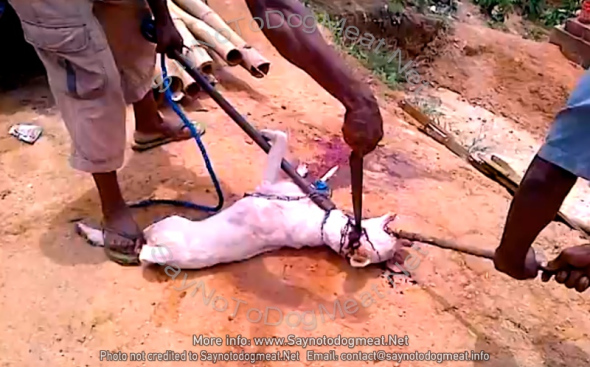
African dog butcher brutally slaughtering a dog for dog meat; the dog was in agony and fully conscious for several minutes.
Saynotodogmeat.Net Director Dr. Josa Depre advises that people refrain from eating dogs within Ebola infected zones. “Consuming dogs within an infected zone and knowing both dog can carry and show no signs is no different to playing Russian Roulette with one’s life,” says Dr. Depre.
Dogs in Africa are typically kept as pets to assist with hunting and are not “fed,” and therefore forced to scavenge food for themselves. In places like Liberia for example, dogs eat the carcass of Ebola infected animals and those same dogs are then captured by dog snatchers and sold for human consumption.
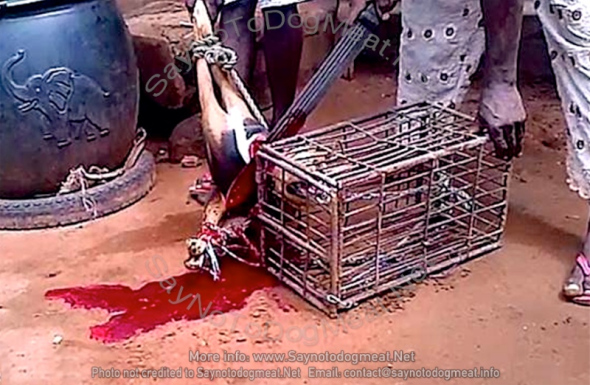
African dog butcher slowly slaughtering a dog, using a panga. Fully conscious, the dog was alive and in great agony for several minutes.
To date there have been no documented infections in felines, meaning that our domestic cats are probably safe from it.
Although dogs are susceptible to Ebola, the CDC concluded that “infected dogs are asymptomatic”, meaning that they do not develop symptoms.
During the early phase of their infection, however, they can spread the disease to humans and other animals through licking, biting, urine, and feces. However, the good news is that once the virus is cleared from the dog it is no longer contagious.”
Chop Shops In Mali
In San, Mali, there’s a restaurant in the old Bamabus terminal at the intersection turning south from the center of town. San is part of the Bobo ethnic area where dog meat is regularly served and eaten “as beef.” Restaurant reviews in Mali suggest that if you do not want to eat dog meat then you should stay away from ALL beef dishes, especially “chop shops” in certain areas, as a lot of the so-called beef is dog meat.
Guinea, which hasn’t closed any of its frontiers with six other nations, shares more than 800km of border with landlocked Mali to the east.
Ebola
Vaccines are not available until the first half of 2015, which is cold comfort for those who need vaccines immediately. Media statements such as “committed to ramping up production” by pharmaceutical companies are hollow words until the vaccines are actually produced and in use.
In America a New York doctor, Dr Craig Spencer who returned from Guinea on October 17th, has tested positive for Ebola, sparking terror amongst Americans after it was announced that the doctor had been travelling on the subway, possibly infecting other people. He is the first Ebola case diagnosed in New York, and the fourth in the US. On Tuesday he began to feel tired and developed a fever and diarrhoea on Thursday (BBC.)
The Ebola fatality rate can reach 90% - but current outbreak has mortality rate of about 70%. Incubation period is two to 21 days and there is no proven vaccine or cure. The current outbreak is the deadliest since Ebola was discovered in 1976.
An international team of scientists has been set up to determine the effectiveness of using the blood of Ebola survivors as a treatment. It is hoped the antibodies used by the immune system to fight Ebola can be transferred from a survivor to a patient.
How Not To Catch Ebola:
* Avoid direct contact with sick patients as the virus is spread through contaminated body fluids
* Wear protective cover for eyes
* Clothing and clinical waste should be incinerated and any medical equipment that needs to be kept should be decontaminated.
* People who recover from Ebola should abstain from sex or use condoms for three months
As with all the other Ebola infected areas, people in Mali are being urged to use soap when washing their hands. It is not customary to do this in Mali, but the World Health Organisation are stressing the importance of it.
All the African countries affected by Ebola are dog eating countries. There is a link between Ebola and dog meat.
DO NOT EAT DOG MEAT!
Thank you for reading,
Michele Brown.
GLOBAL MARCH
Saturday April 4th, 2015 Saynotodogmeat.Net is hosting a Global March for dogs and cats in the live meat trade. Please march with us, in your country. It will be an orderly and peaceful march but we need more ‘demonstration leaders.’ If you can help us, PLEASE EMAIL: CONTACT@SAYNOTODOGMEAT.INFO
Bring your family, children, pets and banners; we need as many people as possible, worldwide. Please mark your calendar and join our march. If you haven’t already done so, please click the box to let us know you are coming: https://www.facebook.com/events/294347744053559/
SAYNOTODOGMEAT.NEt NOW ACCEPTING DONATIONS
Saynotodogmeat.Net is now accepting donations: PLEASE MARK ALL DONATIONS “SAY NO TO DOG MEAT.NET” https://www.facebook.com/SayNoToDogMeat/app_117708921611213
No donation is too small and we are very appreciative of your help and support. Very soon we will be writing a full article outlining where donations will be used. You will receive an electronic receipt and we will too, which we will keep for historical data purposes. NO DONATION will be used to produce clothing with logos on, badges or banners. Donations are NOT for the directors. ALL MEMBERS FUND THEMSELVES.
PLEASE CONTINUE TO SIGN AND SHARE SAYNOTODOGMEAT.NET PETITIONS; WHEN COMPLETED THEY WILL BE HAND DELIVERED
PETITION FOR SOUTH KOREA
https://www.change.org/en-GB/petitions/president-geun-hye-park-take-dog-cat-meat-off-the-menu
PETITION FOR VIETNAM and THAILAND ANTI-SMUGGLING
https://www.causes.com/actions/1764795-a-petition-to-president-truong-tang-sang-moj-prime-minister-yingluck-shinawatra
PETITION FOR HEALTH MINISTER OF VIETNAM
https://www.causes.com/campaigns/71258-minister-of-public-health-thi-kim-tien
PETITION FOR NAGALAND
https://www.change.org/en-GB/petitions/additional-chief-secretary-take-dog-meat-of-nagaland-menu
PETITION TO BAN THE TRADE IN NIGERIA
https://www.change.org/en-GB/petitions/governor-of-lagos-hon-babatunde-fashola-ban-the-nigerian-dog-meat-trade-lagos
LETTER TO THE PRESIDENT OF THE PHILIPPINES
http://saynotodogmeat.net/2014/04/04/email-the-philippines-president-to-end-the-dog-meat-trade/
PLEASE SEND TO THE MUSLIM COUNCIL
http://saynotodogmeat.net/2014/01/17/open-email-to-the-muslim-council-of-great-britain/
PLEASE HELP THE PEOPLE OF TURKANA HERE
http://saynotodogmeat.net/2014/01/31/turkana-africa-emergency-aid-letter/
EMAIL THE GOVERNOR OF NIGERIA: New Address: info@nigeria.gov.ng
http://saynotodogmeat.net/2013/12/03/email-excellency-dr-honorable-alausa-excellency-honorable-babatunde-fashola/
JOIN THE WORLDWIDE GLOBAL EVENT HERE TODAY
PLEASE EMAIL US A.S.A.P FOR INFORMATION ON HOW YOU CAN HELP. SATURDAY 4TH APRIL 2015 – TIME TO MARCH FOR DOGS AND CATS IN THE MEAT TRADE.
JOIN HERE https://www.facebook.com/events/294347744053559/ SHARE EVERYWHERE WILDLY
African Dog Meat Traditions and Disease - Graphic
Recently my visit to Africa have become quite intense over the past few years travelling mostly north west and east to Ghana, Nigeria, Liberia, Somalia and Angola I have been investigating the pet meat and bush meat trade that receives very little mention within the animal rights theatre and world of conservation.
Pet meat trade within Africa was fairly unheard of and still is to this day, most trades are either in villages remotely cut off from much larger cities or from what I myself I have investigated and researched seen only a small minority of pet meat consumption within “indigenous” tribal lands. One cannot just enter these small remote villages and begin photographing markets that host a wide range of animal and human parts too. Yes I did state human body parts mainly within the regions of Ghana on the Voodoo markets. I state you cannot just enter these markets and begin photographing unless of course you wish to become a “part of the bench stall”.
Why did I begin investigating the pet meat trade deep within the north and Central African Republic? Within the past decade there has been quite a significant increase in disease and deaths within the visited Africans zones that host “pet meat trade”. I am also somewhat frustrated that the World Health Organisation (WHO) either seems completely oblivious to this truth or are deliberately concealing information in some way to try and play down increasing deaths from Rabies, Severe Acute Respiratory Syndrome and Coronavirus all of which are increasing within Africa and pose a significantly high bio-hazard threat to the world population.
International Animal Rescue Foundation Africa and Say No To Dog Meat.Net an Australian and Africans/European registered organisation and Environmental Company are now working on specific missions to now decrease pet meat consumption trade mainly within the north and Central African Republic thus creating awareness, educations and implementing sustainable agriculture practices as well as helping to establish water safe zones that shall be spoken more about in next week’s article.
International Animal Rescue Foundation Africa mission’s within Africa with regards to the pet meat trade I have highlighted below for your information;
- Reduction of Rabies, Severe Acute Respiratory Syndrome, and Coronavirus cases via promoting sound and professional education, awareness, vaccination and meat alternatives.
- Pet care – Trap Neuter and Return – to reduce stray populations thus decreasing pet meat consumption.
- Food safety – Professional food and hygiene education and awareness of which is aimed at reducing “food borne viruses” entering the food chain from contaminated pet meat thus decreasing illness, death and contagious cross infection. I.A.R.F Europa is also working on implementing plans to educate mainly the male population that use dogs to hunt. It has been noted that dogs used to hunt within Liberia for example have brought back to the local communities Ebola virus. Strategies on reducing this danger are being worked on rapidly to reduce death and disease. To help please send a donation to us hereto that will help immensely. Alternatively you can donate via our main communications site here.
- Water preservation – education and awareness of greener arable agricultural practices that we hope will reduce the need to hunt and kill pets within local remote communities that are under great strain from the effects of climate change. Climate change has ravished the African continent leaving many without water to farm or care for cattle. Working with Africans communities and engineers we hope to eradicate this problem within pet meat consumption villages. Turkana within Kenya is one prime example of which has seen climate change ravish the entire area forcing people to eat dog and cat meat. Local communities are as of April 2014 now receiving some help from international organisations.
International Animal Rescue Foundation Africa mission is aimed at the following countries within the continent of Africa; Please note we have not included Madagascar of which is still under scrutiny from ground operatives detailing the bush meat trade.
- Angola
- Ghana
- Niger
- Benin
- Cameroon
- Liberia
- Somalia
- Democratic Republic of Congo
- Chad
- Mali
Recently I have been working just over the border of Benin in Togo where dog meat and bush meat trade is rampant of which is threatening the world’s population should any form of the above mentioned viruses find their way to Europe, America or Asia. Research is still being hampered by the lack of education and awareness in the country of which rabies cases are increasing. It appears even if the infected victim is showing signs of rabies they’ll still be consumed regardless of what the after effects will be onto the human consumer[s].
Bongo;
The increase in consumption of dog heads in the Bongo District is said to be hampering research efforts into rabies cases reported at the district hospital in the area. Dogs suspected to carry rabies, popularly known as “mad dogs” among the people, are killed and eaten, including the heads that are usually the part that is examined to determine the presence of rabies. The consumption of the dog meat has gone up in recent times in the district, with residents now desiring it during their leisure times. Dog meat is usually not used in preparing meals at home because of the belief that not everyone takes the meat.
This was made known on Monday [5 Apr 2010], when Dr Vivian Brusset Cisneros, a Cuban doctor, presented a paper on the epidemiology of rabies in the Bongo Hospital at the 11th Regional Scientific Workshop between Ghanaian doctors and their Cuban counterparts in the Upper East Region. She said the practice hindered effective research into arriving at conclusive decisions on suspected rabies-related deaths. She said so far the hospital has recorded about 101 suspected rabies cases, of which 47 have been treated and discharged with 5 people losing their lives.
Dr Cisneros indicated that in December last year [2009], 19 dog bites were recorded and said that the majority of the reported cases came from Namoo, a frontier with Burkina Faso and Bongo central. She said that a dog census conducted put the number in the Bongo District at 8217, with only 1843 of them vaccinated against rabies. Dr Cisneros said that if the rabies scare in the area is to be contained, then dog owners should vaccinate their dogs.
The Regional Director of Health Service, Dr John Koku Awoonor Williams, called for a strong surveillance system at the district level to check outbreaks of all kinds of diseases. He said the idea about sending data to the Regional Directorate from the district level, without analyzing them, slowed down the alarm system [for] disease outbreaks. [Previously in 2009, it was reported that: “The people of Bongo are living in fear now with every passing moment and demand the immediate supply of anti-rabies vaccines for the treatment of infected persons. They are also calling on the veterinary division of the Ministry of Agriculture to, as a matter of urgency, take steps to vaccinate all dogs and possibly cats to prevent further spread of the disease.”
It is difficult from the present report to estimate the extent of the problem, but there appears to have been human cases (5 fatalities out of a possible 47 cases presenting for post-exposure prophylaxis). It is similarly difficult to estimate the extent of the diagnostic problem. Perhaps the dearth of canine heads is no more than an original bureaucratic excuse for inactivity. Please note these figures are only for the period of 2009 of which will be updated within the next few months from our field veterinarians.
Nigeria;
Stray dog meat and the risk of rabies in Nigeria is becoming quite a concern for us. While rabies is a preventable zoonosis with very high mortality, dog meat remains a delicacy among some communities if not (all communities) in southern Nigeria. Thus far there have been a reported 10 cases of rabies following consumption of dog meat this year (2014). All the 10 patients died. Authors of Rabies research have called for culling of stray dogs, control of trade in dog meat, and provision of post exposure prophylaxis (PEP). This is by far more easily said than practiced when people’s livelihoods depend on pet trade regardless of whether the meat is infected with rabies, sars, or Ebola virus.
About 55,000 people worldwide die of rabies every year, 44% of them in Africa and yet the (World Health Organisation) still fail to make public the immense risks of consuming dog meat in Nigeria even though International Animal Rescue Foundation Africa has shown evidence year after year.
Togo – A tourists account of the Togolese’s Dog Meat Trade
The Evela wrestling ceremony or just Evela ceremony takes place every summer in Kabye villages around Togo. The Kabye people are an ethnic group from the North, known to eat dog. In the morning, the young men douse themselves in talcum powder and wrestle in a giant circle. On the outside of the circle, and in trees scattered around the village, hang dead dogs. Strung up by their necks, the dogs dangle lifelessly with their tongues hanging out of their mouths. I watch the men go through the same routines they do with goats. Light a fire. Burn off the hair. Cut off the head. Place burnt head on stake. Make dog-kebabs. International Animal Rescue Foundation is formulating a petition against this cruel and barbaric ceremony.
I enter a straw hut with my friends and two other PC volunteers who have already made the decision not to try dog meat. But I have been talking for weeks about how I was going to try dog at this festival, so I couldn’t back out at this point. As I take my first bite, my friends note how I am noticeably shaking. I struggle to keep a steady hand as I pop the gristly morsel into my mouth. While I chewed my mind was bombarded with visions of all the dogs I have ever had. Kacy chasing the tennis ball. Abby fogging up the glass on our front door. As I take a second and third piece, and chew through the fat and the pieces of skin with fur still attached, I try to pinpoint the flavor. Not quite chicken but not quite beef. Then I realize, and maybe this is my mind playing tricks on me, the meat tastes exactly how a dog’s breath smells. I gag on the fourth piece. I take two shots of Sodabe (palm wine) and decide I’m done here.
History of Evela wrestling and Dog Meat Consumption
Picture above depicts the Kabye young boys wrestling as part of the ceremonial ritual. The event will again take place this July 2014 of which will see dogs and cats brutalised for traditional beliefs. Picture below depicts the same tribe of which the dog is supposedly seen as (sacred). Please view video below.
Boys – well 18, 19, 20 year old “boys” can’t consider themselves men or taste dog meat until they fight in Evala, a coming of age intra-village wrestling match. One-on-one, contenders from Kabye villages (Kabye is one of the major ethnic groups in Togo) take on opponents attempting to outmanoeuvre or outman them until their opponent’s butt hits the sand. Weeding out the finest wrestlers from the village stock, the dozen or so best represent their village clad in Rocky-style gym shorts in front of a crowd of cheering Kabye citizens, out of place European tourists, the odd peace corps volunteer and on occasion President Faure (who comes from a Kabye village and took down a few wrestlers in his day). The annual rite of passage comes with some benefits. Aside from eating dog meat for the first time, which is strictly a man’s delicacy in Kabye culture (Ça donne la force!), the wrestlers can marry after fighting in Evala for three years.
A male Kabye friend told me, “You aren’t considered anything if you didn’t fight. And men who placed high are respected in their villages.” He said if two boys were going after the same girl, and one of them was a champion the other boy would step down respecting the other’s rank.
And the ultimate fighter, the one left standing at the end of the week, gets to choose any Kabye girl, taken or not, as his wife or companion. That last spoil has repelled some progressive Kabye citizens from celebrating Evala. The prefet explained that the traditional ceremony stands as a test and proof of the stamina and power of the Kabye people who are always ready to defend their communities.
“They pass from adolescents to adults taking a step in the school of life,” the prefet wrote. Akpema, the younger, less noticed sister of Evala, is the female version of the boys’ rite of passage. For the next few weeks during Akpema, girls – well 16 - 20 year old girls will walk around village in their underwear or barely clothed– traditionally they do this nude. They perform ceremonial rites in order to be accepted by their family as a “good woman”.
The consumption of dog meat is an important aspect in the course of the three-year initiation process, the dog being considered cunning, enduring, courageous, smart and faithful, all of which qualities the evalon needs to be able to defeat his opponents during the fights. During the week preceding the competition, the evala get ready by going in isolation and by stuffing themselves with dog meat. They refrain from shaking hands with girls and from having sex, in an effort to keep their physical and psychological potentials to the maximum. After the three-year initiation, the evala must never eat dog meat again. Which is quite surprising as dog meat is noted as being consumed in Togo on a regular daily basis.
Rabies;
Rabies cases still remain the highest within Africa of which Southern Africa we have yet to locate “any evidence” on dog and cat meat consumption and trade, however rabies cases within impoverished “South African zones” has been noted to be on the increase of which we are still currently investigating. Nigeria still remains the continents highest rabid infectious areas of which is being tackled however not as quickly as one would like it to be. The myth that dog meat is only consumed in the south of Nigeria we can officially debunk. Dog meat we have witnessed not only being sold on the streets in the north but also consumed within market stalls in strict Muslim populated areas of which dog meat is strictly prohibited under Islamic law. Slaughter of any animal under Islamic law must also be “humane” which brings one to ask are the pictures above and below considered humane. The dog took over 4.7 minutes to perish, even after having its throat slit with a rusty panger the animal was still withering in pain, still moving, still yelping. Wagging its tail too which was somewhat quite emotionally upsetting for myself to view being a dog lover.
Rabies, though a vaccine preventable disease, still accounts for the death of over 50,000 people worldwide; 95% of these fatalities were apportioned to Africa and Asia while 98% of the cases were caused by rabies infected dog bite. Worldwide, lines of evidence abound supporting the fact that dogs shed rabies virus in their saliva (Nottidge, 1994). Fekadu et al. have established that rabies infected dogs that recovered shed rabies virus in their saliva intermittently, and this shedding continued for about 7 months while the dog remained apparently healthy; this represents a carrier status which was previously described in Nigeria. Inapparent infection and recovery from clinical disease with resultant persistent or intermittent shedding of rabies virus have affected the overall effort in rabies eradication and control in most parts of the world. The most dangerous aspect of carrier dogs is that bites from such dogs are usually not recognized as an exposure that will stimulate appropriate postexposure treatment. Consequently human deaths occur from exposure buried in an erratic incubation period where dogs show no sign suggestive of rabies.
Abia State shares border with Cross River State. Recently, 8 people died and the cause was traced to dog bite. Those dogs were disposed of before reports got to Veterinary authorities, and it has been suggested that those suspected dogs must have been consumed before the onset of clinical signs thereby precluding confirmatory diagnosis.
Work on rabies in apparently healthy dogs has been carried out in different parts of the country. However, information on rabies in Abia State is wanting despite rabies outbreak in neighbouring states. There still exists an eclipse of information on rabies epidemiology in Abia state; there is therefore a need to find out the status of rabies in the state, especially carrier status. This study was undertaken to find out the presence of rabies antigen in the saliva and brain of apparently healthy dogs slaughtered for human consumption in Abia State and to find out the practices of dog meat slaughtering by butchers who fall within the high risk group.
Severe Acute Respiratory Syndrome;
Amazingly, we are repeatedly reminded about bioterrorists and bioweapons, yet with SARS not a word about biowarfare. Certainly proof the media are controlled by powerful forces that refuse to recognise what many citizens are thinking privately, and posting on the Internet.
The earliest April 2003 media reports detailed a mysterious lung disease (acute respiratory syndrome or ARS) that broke out in Guangdong province in mainland China, close to the island of Hong Kong. Shortly thereafter, I received an email describing similar epidemics of ARS with many deaths in the Congo and on the island of Madagascar, off the coast of Eastern Africa, in the summer of 2002. In the beginning of the epidemic, the Chinese scientists claimed the lung disease was caused by a bacterium (a chlamydia); Western scientists and the World Health Organisation (WHO) suspected a coronavirus. Please note while International Animal Rescue Foundation knows pet meat trade is ongoing in Madagascar evidence of such virus’s associated with pet meat trade has yet to be put forward.
For anyone doing research, an Internet “search-engine” like google.com is invaluable. I typed-in “acute respiratory syndrome African cases 2002”, and quickly discovered WHO reports of ARS in the summer and fall of 2002. In civil war-torn Congo, there were 4000 cases of ARS reported in October 2002, with 500 deaths, making the death rate 12%. In contrast, the Chinese mortality rate from SARS was initially (and erroneously) reported as 3-4%. Even though the African ARS death rate was four times higher, the WHO added the letter “S” and termed the epidemic in China “severe” ARS (SARS). In Madagascar, another country torn by civil strife, the ARS epidemic affected 22,646 people, with 153 deaths. Both epidemics were believed to be caused by influenza A virus, although none of the cases were tested for unusual coronavirus infection. None of these African pre-SARS epidemics were reported by the Western media. Do you see now why we International Animal Rescue Foundation Africa and Europa are becoming rather concerned and frustrated at this lack of public awareness? For instance this month of May there have been a further cluster of Ebola cases (see pic) within Liberia – all cases have not been reported in the media nor has the media reported “potential cases” emerging in Europe via Africans traveling abroad. Media and press we believe have been warned not to create a mass panic even though Ebola has not been eradicated from the African country of Liberia in West Africa.
Within days of the first April reports, WHO investigators claimed Chinese health officials were lying by covering-up the first cases of SARS that occurred in mid-November 2002. It is possible the ARS epidemics in Africa had nothing to do with SARS in China. However, it is well known that Sub-Saharan Africa is a testing place for new vaccines and drugs, and presumably for biowarfare agents as well. By April 17, WHO officially recognised the new coronavirus as the cause of SARS, and named it the SARS virus. Could the new coronavirus/SARS virus be biological warfare? No one in the media was asking that question.
Meanwhile pet meat consumption is increasing and with thanks to countries such as China, Vietnam, Laos and Thailand dog meat traditions within Asia are seen as ethically correct practices by African pet meat consumers within the Continent of Africa. What’s good for one is good for the other as they say.
Ghana;
Dog meat, a delicacy in some parts of the Northern and Eastern regions but frowned upon in most parts of the country, has now become a delicacy in some suburbs of the Greater Accra Region, especially Bukom, Korle Gonno, Chorkor and Nungua. Worshippers of the Tigare fetish, which originated from the Northern Region, are known to eat dogs, which are the principal animals used for their rituals.
Auntie Adjeley Doku of Mamprobi whose late father, Nii Adjei is reputed to have brought the Tigare fetish from the north to Accra, explained that instead of the use of sheep in rituals at the shrine, dogs are used.
“Of course, when it is thus used it is cooked and we all eat the meat in either a soup or a stew,” she explained.
“Anyone who eats dog meat (cannot be harmed spiritually by any evil doer). This is because just as the dog protects its owner in real life, so does it do so spiritually, and no witch or evil doer can harm you if you eat the meat of a dog”, she added. Auntie Adjeley also believes that more people are beginning to enjoy the meat because they now know its spiritual value; moreover it is very delicious, just like other meat.
It is also known that some people in the Greater Accra Region, apart from the Tigare worshipers, use the dog instead of sheep for their customary rites. At funerals, outdooring’s, engagements and other social events, especially in Chorkor, dog meat is served as part of the meals eaten. The youth also come together at weekends to prepare and consume soup and stews made with dog meat along with banku, gari or fufu.
At Korle-Bu Sempe, a young woman who wanted to remain anonymous narrated how she joined her brother and friends to eat a delicious meal of gari and stew, only to be told later that the wonderful meat she had was dog meat.
She explained that even though she would not have eaten it if she had known it was dog meat, she realised after the meal that, it was no different from mutton. The brother said he was introduced to the meat by his friends with whom he enjoys cat meat.
According to him, it is really good and recommends it to everybody. It is funny the way people behave over the eating of dog meat. I ate it because I knew other people eat it elsewhere, and once it’s good, I have no qualms about it as long as it’s neatly prepared? , he emphasised.
Another lady, Esi, who stays at Chorkor said the first time she ate the meat was at Atibie Kwahu in the Eastern Region. According to her, she and her friend went to a chop bar and her friend requested for it. After she tasted it, she realised it was good and she enjoyed it very much. Nicknames given to the meat at Chorkor are “me you” and “ogele” and those who enjoy it refer to the meat as such.
This reporter was told the story of some ladies who went to a funeral at Chorkor and were given seats in a friend’s room. While they were being served with drinks they saw a pan full of meat and so they took a few chunks to go with their drinks.
“It was so delicious, so when our friend served us kenkey and fish, we requested for some of the mutton in the pan, her reply of Oh! Do you like the dog meat?” was enough to kill our appetites. At Nungua, behind the Ravico Hotel, is a joint where Brukutu, a popular local drink, is served with dog meat, either as spicy khebab or in soup for those who request for it.
Emmanuel Okwei-Addo of Korle Gonno believes that more people are taking to dog meat these days because they are easy to come by and also people are discarding their revulsion for the meat because they have realised that eating it does not cause any harm.
Meanwhile, it is common knowledge that the mere mention of “dog meat” makes many people spit and turn away. To these people, the dog has always been man’s closest pet and companion and so they cannot conceive the idea of killing it, let alone eating its meat. Others too are put off by the fact that they see the dog in all kinds of “compromising” situations and so they find it difficult to consume its meat.
But this notwithstanding, it appears that dog meat is attracting more “adherents” who, rightly or wrongly, may be telling those who find it repulsive: “You don’t know what you are missing”?
Concluding
Cultures, traditions or just religious beliefs that span around the consumption of dog and cat meat within Africa must stop sooner rather than later. Researchers from International Animal Rescue Foundation Africa are working in remote regions of Africa studying the trade and understanding ways in which we can halt the trade without disrupting livelihoods. Please do not get ones hopes up to much. Whilst there are uneducated tourists travelling from America and Europe (please view video below) promoting the trade as “ethically correct” without understanding the sheer dangers of what their promoting pose to the entire planets populations then unfortunately we will be fighting a very harsh battle. Will it take mass death for international governmental leaders to take notice? Who knows. For now I leave you with a culture a tradition a food myth that has potential to wipe out thousands if not millions should a bio-disease epidemic occur.
Thank you for reading
Dr Josa Depre - Botanist and Environmentalist
info@international-animalrescue-foundation.org.uk
www.speakupforthevoiceless.org
View more here on pet meat consumption at Say No To Dog Meat.Net
Please Donate here to help International Animal Rescue Foundation Fund African Wildlife Survival
“Dogs are our link to paradise. They don’t know evil or jealousy or discontent. To sit with a dog on a hillside on a glorious afternoon is to be back in Eden, where doing nothing was not boring-it was peace.”

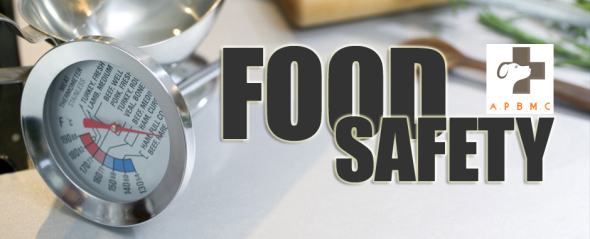
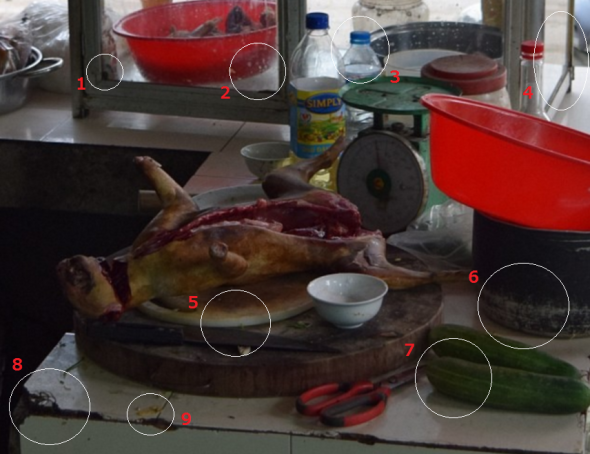
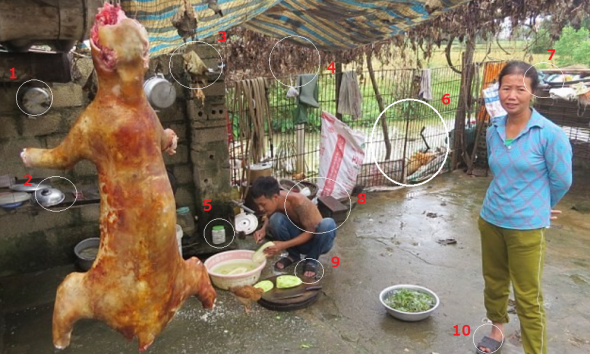
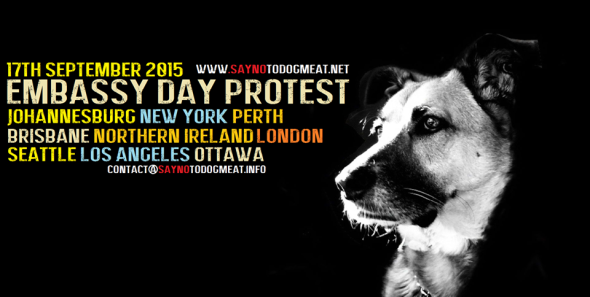
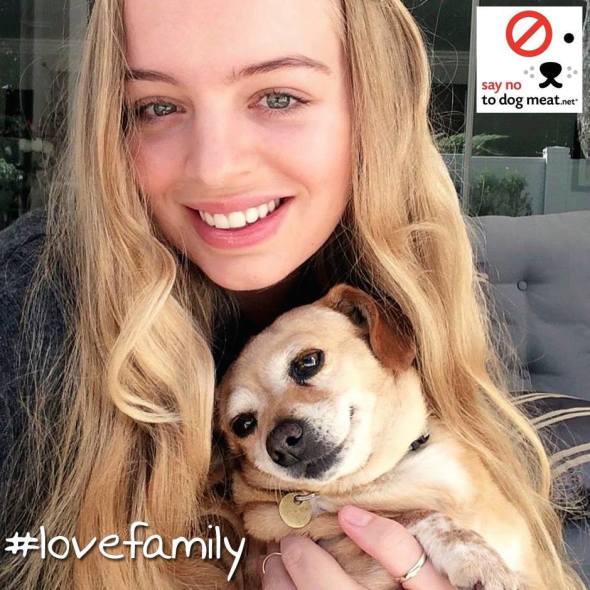
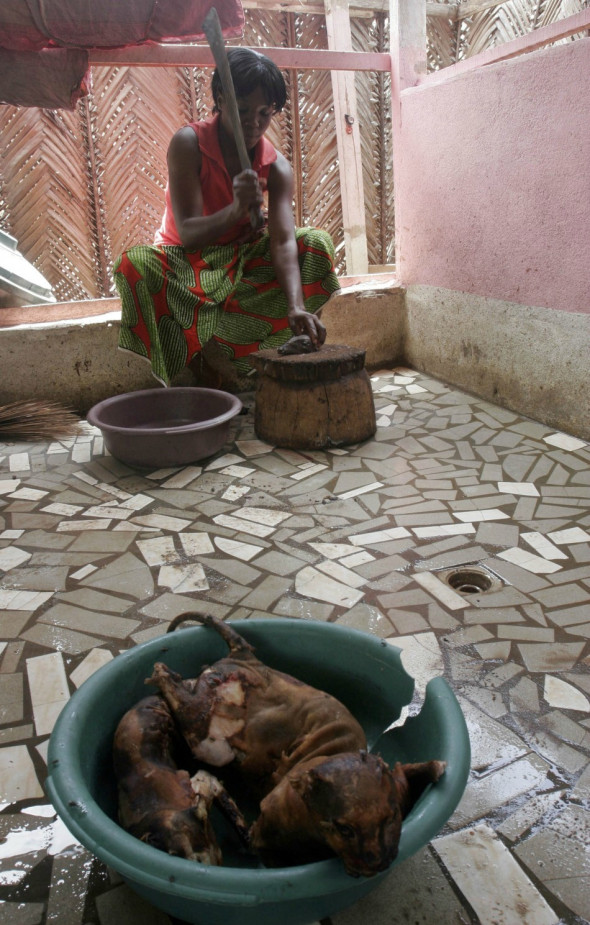
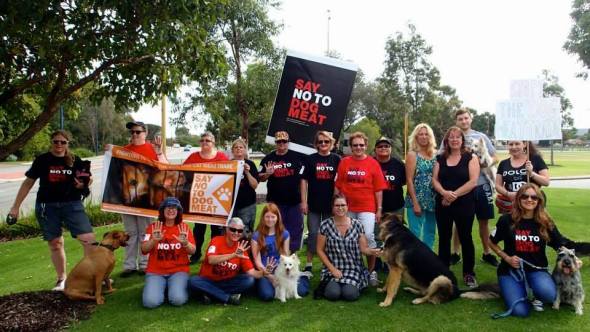
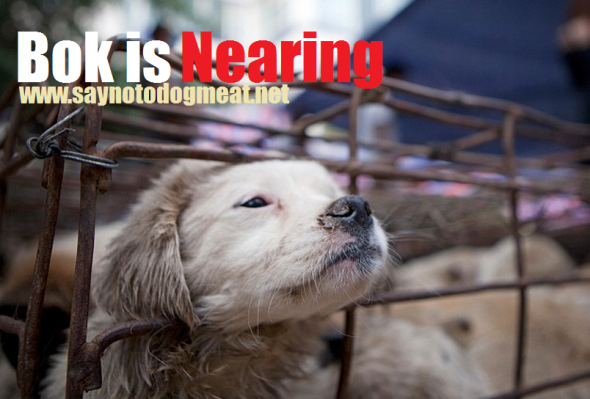
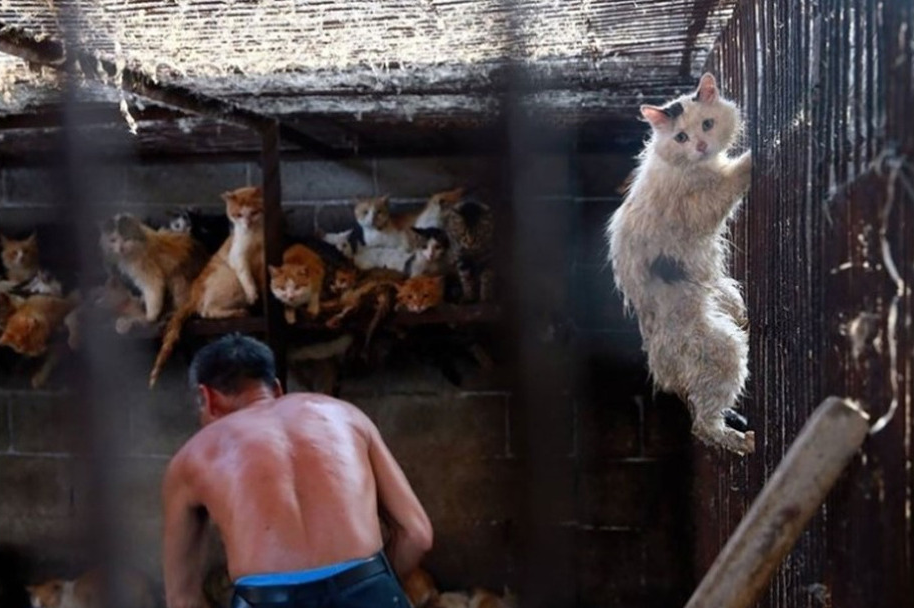
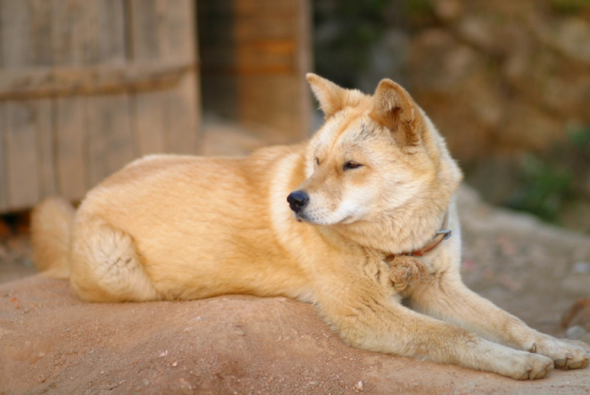
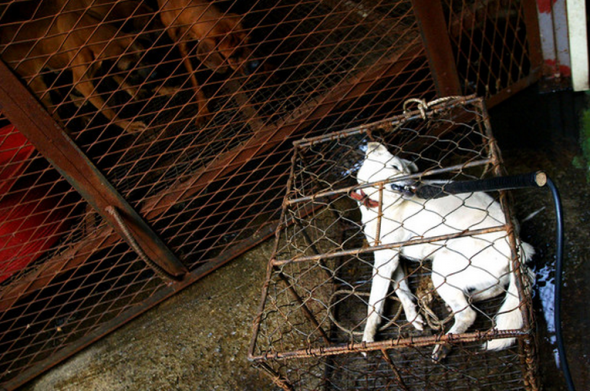
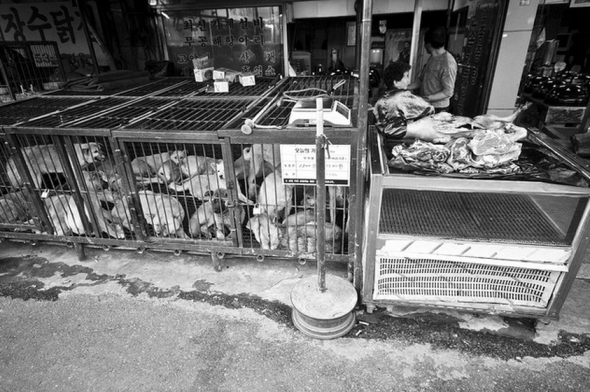
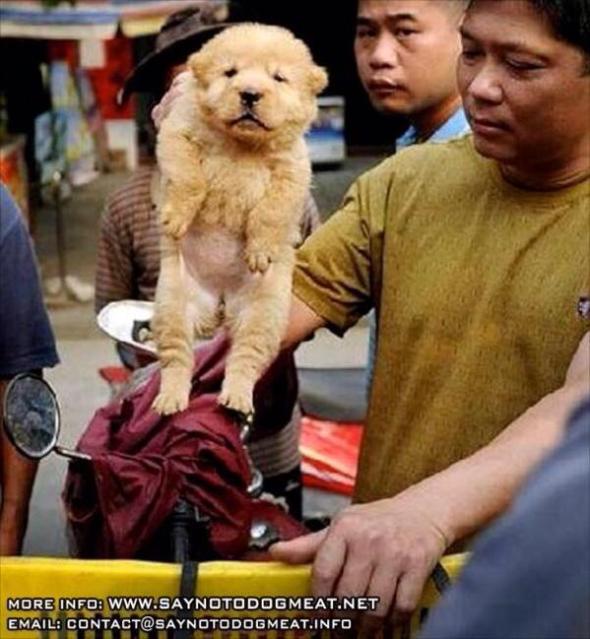
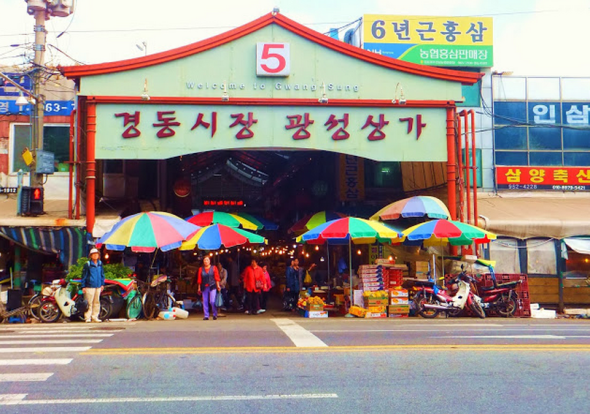
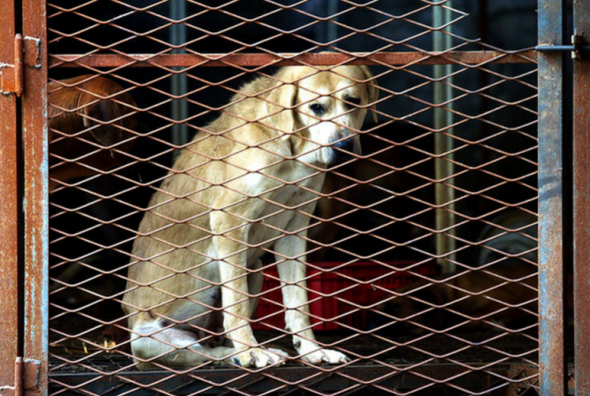
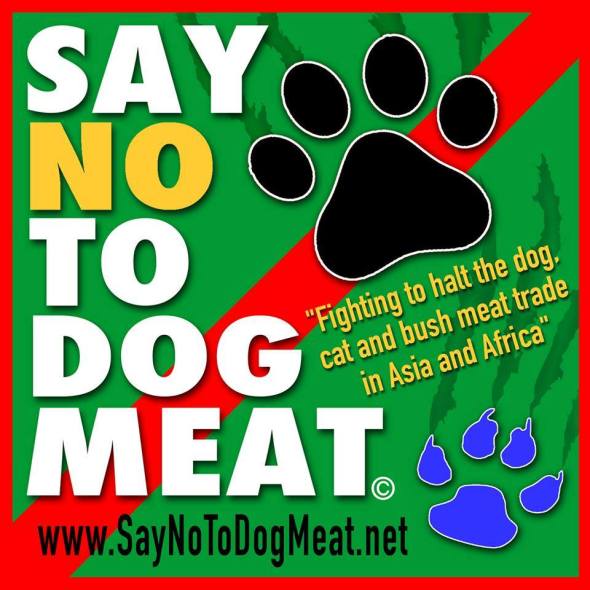
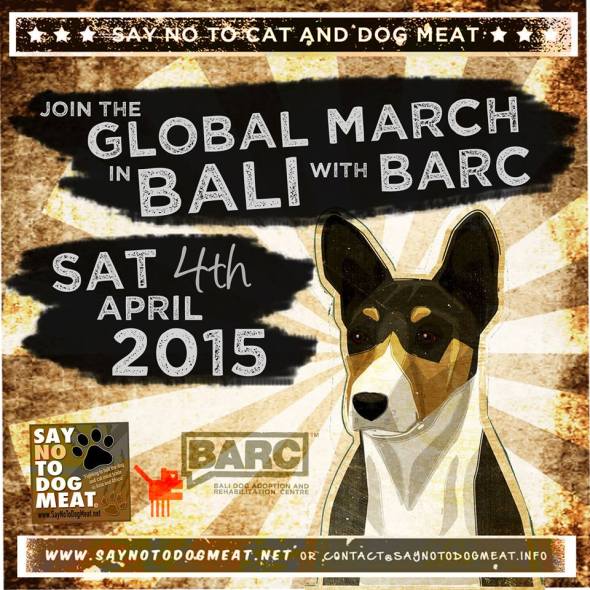

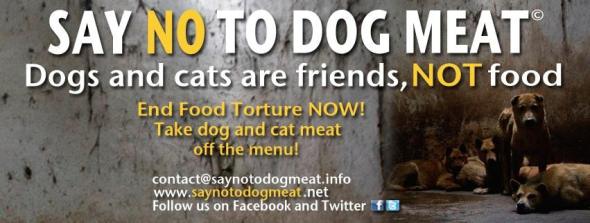
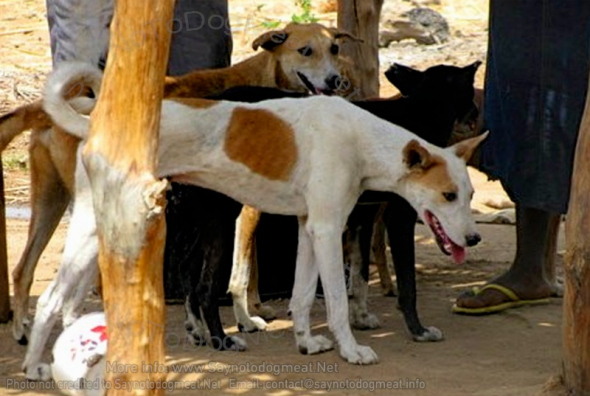
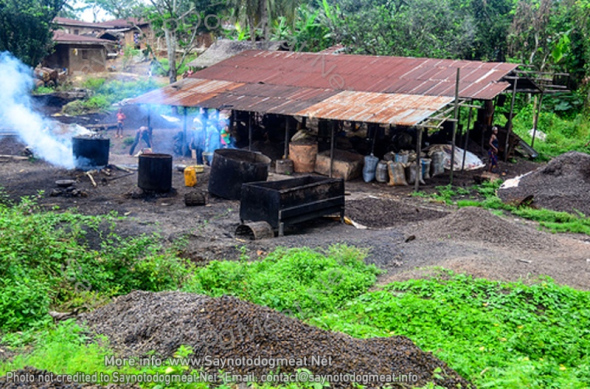
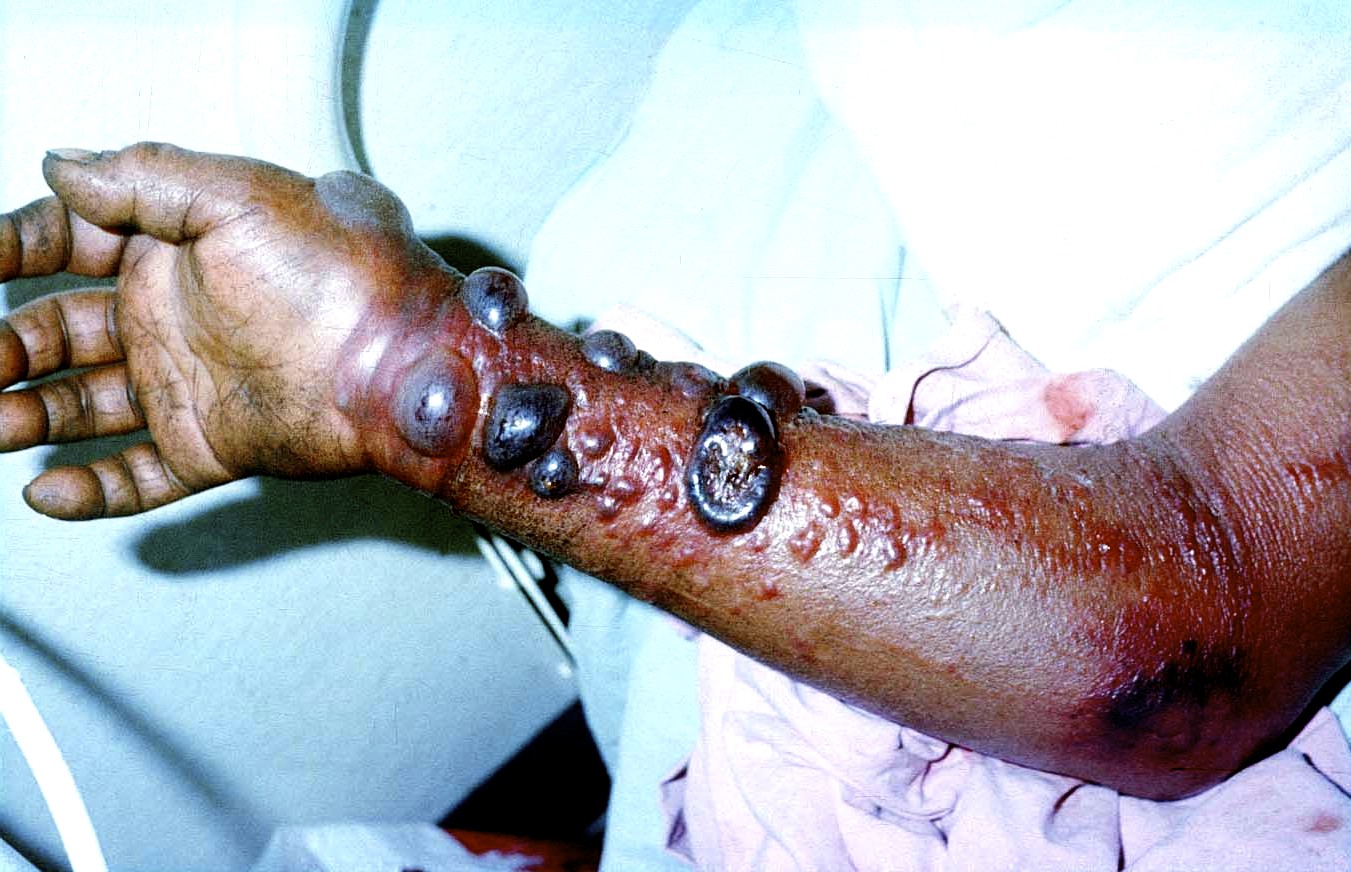
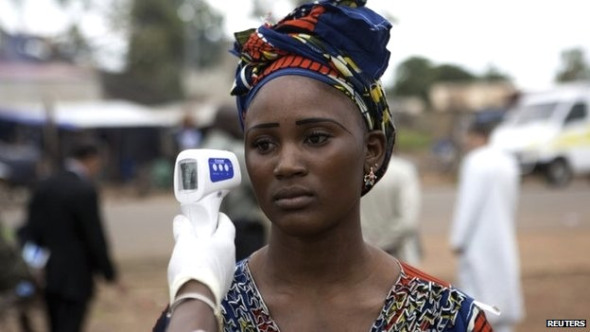
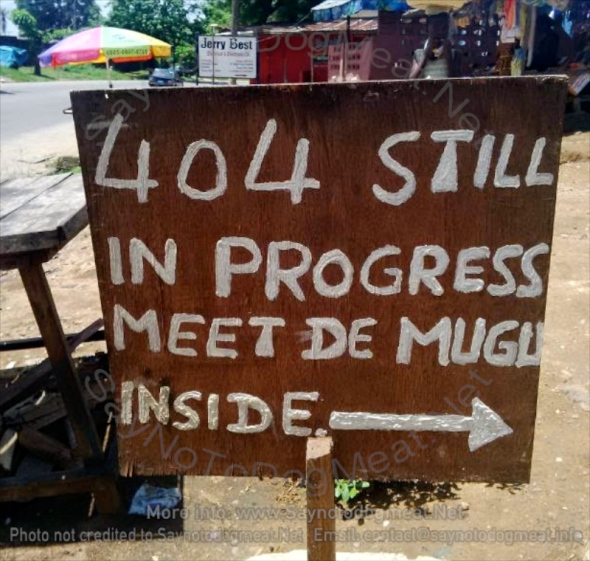
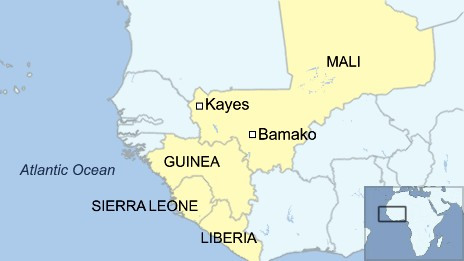
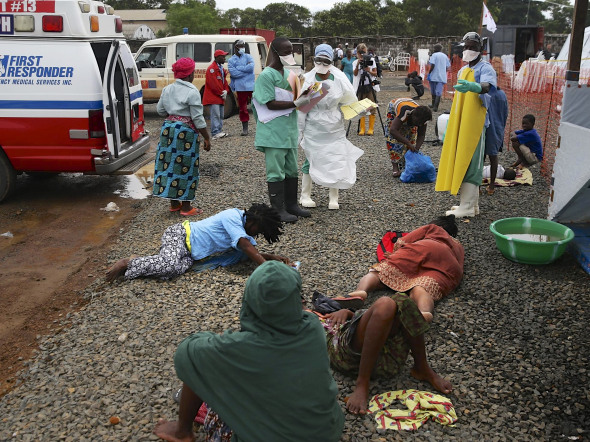
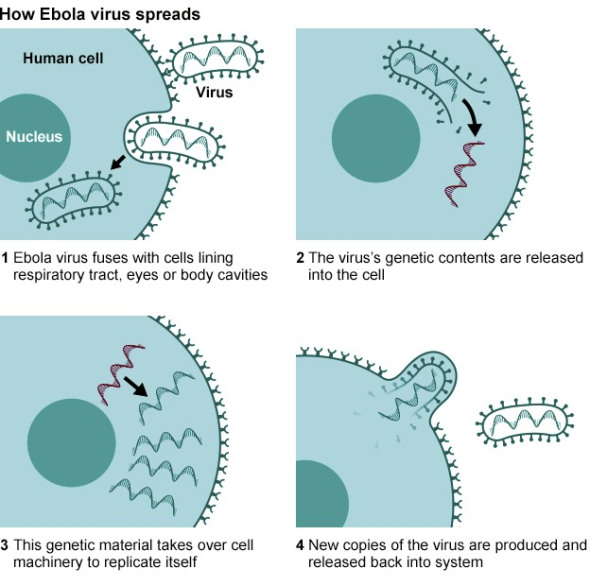
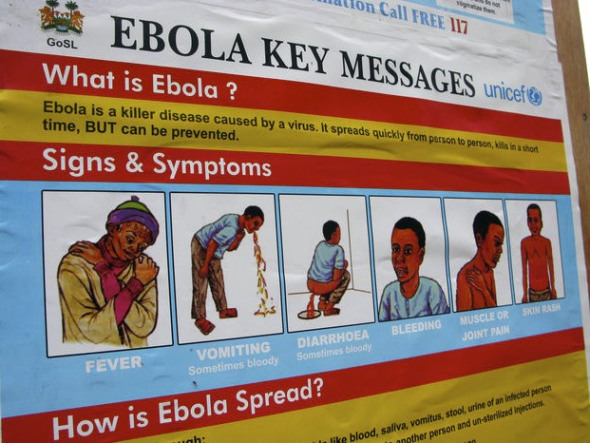
![IMG_3066[1]](../../2014/05/img_30661.jpg)
